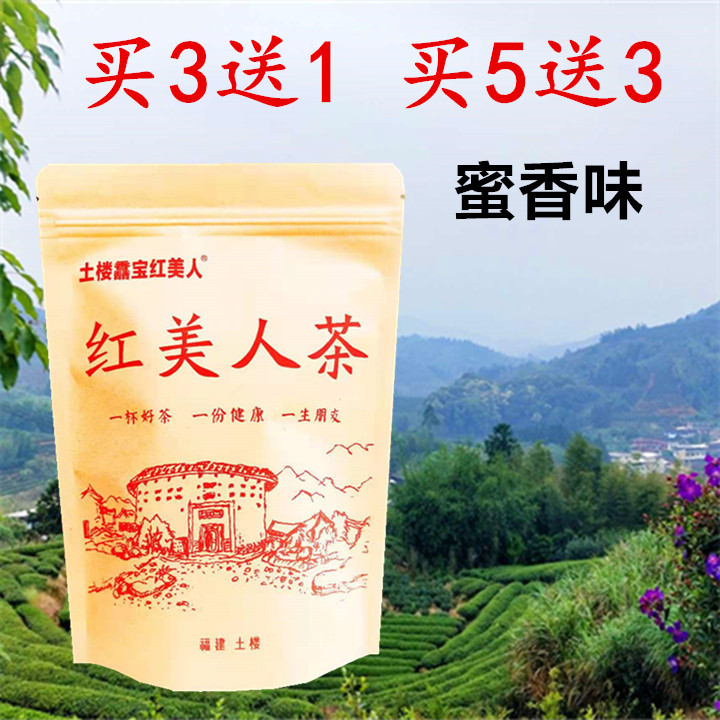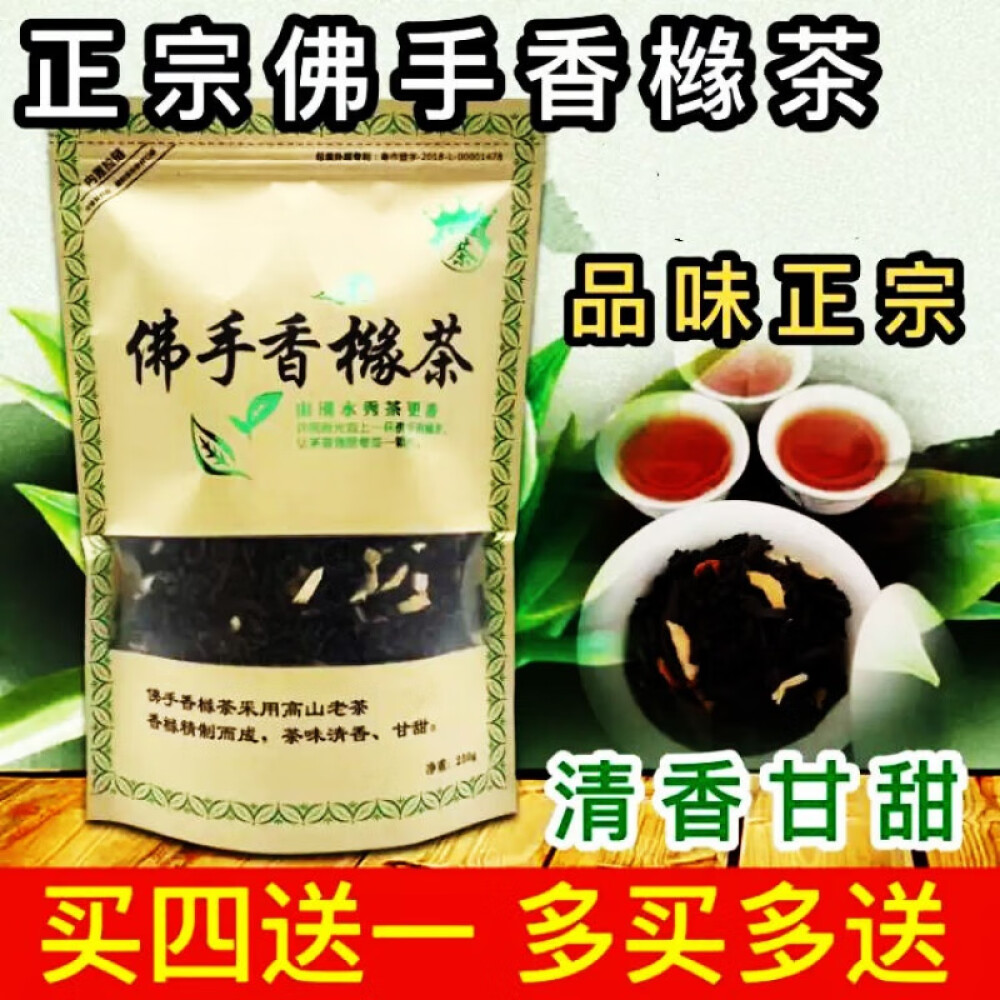-
IP addresses are NOT logged in this forum so there's no point asking. Please note that this forum is full of homophobes, racists, lunatics, schizophrenics & absolute nut jobs with a smattering of geniuses, Chinese chauvinists, Moderate Muslims and last but not least a couple of "know-it-alls" constantly sprouting their dubious wisdom. If you believe that content generated by unsavory characters might cause you offense PLEASE LEAVE NOW! Sammyboy Admin and Staff are not responsible for your hurt feelings should you choose to read any of the content here. The OTHER forum is HERE so please stop asking.
You are using an out of date browser. It may not display this or other websites correctly.
You should upgrade or use an alternative browser.
You should upgrade or use an alternative browser.
SG is money-laundering hub
- Thread starter LITTLEREDDOT
- Start date
How Fujian’s tea capital became known as a 'scam town'
23 Aug 2023By Chen Jing
Shanghai Correspondent, Lianhe Zaobao

Translated by Grace Chong
At least half of the Chinese men who were recently charged in a billion-dollar money-laundering probe in Singapore are from Anxi — a province in Fujian known for producing tea but is now frequently linked to its involvement in scams. Lianhe Zaobao correspondent Chen Jing visits the county to find out how prevalent fraudulent activities are and the impact on its locals.

Luxury cars throng the streets in Changkeng township, Anxi county.
(Photos: Chen Jing, unless otherwise stated.)
A brand new multi-storey house stands next to a row of dilapidated, low-rise brick houses, while BMWs, Mercedes-Benzes, Maseratis and other luxury cars ply the potholed country roads. Such discordant scenes are not unusual in Fujian province’s Anxi county.

Famed as the birthplace of Tieguanyin, a variety of Chinese oolong tea, this county under the jurisdiction of Quanzhou city has in recent years become better known by its other nickname: scam town (诈骗之乡).
The Chinese people even have a jingle for it: nine out of ten Anxi people are scammers while the tenth is an apprentice (十个安溪九个骗,还有一个在锻炼).
Birthplace of China’s telecom scams
At least half of the ten people involved in the recent S$1 billion-dollar (US$735 million) money laundering case that rocked Singapore came from Anxi.I recently visited Nandou village, Changkeng township, Anxi — the hometown of one of the suspects Chen Qingyuan. Because of the absence of markers to identify the unit numbers at the village, I did not find Chen’s exact address but discovered a six or seven-storey house nearby. The stone carvings that adorned the exterior walls alone were nearly ten metres tall.

A passing villager was guarded when I asked about the identity of the homeowner.
“Who are you?” He questioned me back immediately, “Why are you here?”
Outsiders can easily attract attention in Nandou village because the area is mostly populated by the elderly and left-behind children, with hardly any young people around. A provision store owner told me that the local economy has been in a slump and most of the younger generation have gone elsewhere to earn a living. “But the people are slowly returning for the Hungry Ghost Festival rituals,” the owner said.
Changqing township, two kilometres from Nandou village, is seeing a wave of people returning to their hometowns for the Hungry Ghost Festival that falls on the seventh lunar month. Street vendors have set up stalls to sell all sorts of products such as meats, produce and pesticides, further congesting the already narrow road. Within a short span of ten minutes, I already saw four BMWs, two Mercedes-Benzes, and two Maseratis drive past the market, most of them had Quanzhou or Xiamen licence plates.

While there is no lack of luxury cars and mansions, Changkeng township is relatively lagging behind in development. Dilapidated houses line the street, while roads and other infrastructure remain in disrepair.
A person familiar with the local situation revealed that Changkeng is seen as the birthplace of China’s telecom scams. But most locals get involved in scams or open online casinos elsewhere, and only return to their hometowns to build houses or buy properties in neighbouring cities after they strike it rich.
Luxury homebuyers in Xiamen
The address of Wang Shuiming, a member of the money-laundering “Fujian gang”, is not registered in his hometown of Anxi but in Nanhu Zhongxiang Mansion (南湖中祥大厦), downtown Xiamen. Based on real estate websites, homes in the neighbourhood are currently priced at around 90,000 RMB (US$12,500) per square metre.Wuyuan Bay is jokingly referred to as “Anxi Bay” because of the sheer number of homebuyers from Anxi. These luxury homeowners are often overseas and mostly own more than one property.

The registered address of another suspect Wang Dehai is Jian Fa Yang Zuo (建发央座) in Xiamen’s Wuyuan Bay. This is one of the most expensive properties in Xiamen, with prices as high as 150,000 RMB per square metre. Based on housing advertisements, all units in the compound are massive sea-view homes of at least 300 square metres, with asking prices starting from 50 million RMB.
Xiamen private-hire driver Liu Wenyi said that Wuyuan Bay is jokingly referred to as “Anxi Bay” because of the sheer number of homebuyers from Anxi. These luxury homeowners are often overseas and mostly own more than one property.
The aforementioned person familiar with the local situation pointed out that in the past, the wealthy in Anxi mostly made their fortune from the tea business. But with the decline in Tieguanyin sales in recent years, more people are turning to telecom scams, online gambling and other illegal activities, with the successful ones quickly expanding their operations and recruiting even more relatives and other locals.

In 2016, then Anxi party secretary Gao Xiangrong told a Chinese media outlet that telecom scams had first emerged in Taiwan, with some of them roping in their relatives from Anxi afterwards. Subsequently, Anxi people continued these scams and grew their operations. Of the county’s 1.2 million people, Gao estimated that about 2,000 are telecom scammers.
... many Anxi people have fled the country to avoid arrests, moving the base for their scam operations to Southeast Asian countries such as the Philippines, Myanmar and Cambodia.
Locals bearing the brunt of bad reputation
With China’s police force ramping up their efforts to crack down on fraud, many Anxi people have fled the country to avoid arrests, moving the base for their scam operations to Southeast Asian countries such as the Philippines, Myanmar and Cambodia.Banners with the words “All-out effort to combat telecom fraud” are plastered around Nandou village, and the village’s exit point displays posters encouraging locals to report escapees, with rewards ranging from 50,000 RMB to 100,000 RMB.
The public security bureau in Anxi has repeatedly asked people involved in overseas illegal activities including online gambling and scams to return to their hometowns to turn themselves in. Since last year, they have also prohibited people whose hometowns are in Anxi from heading to eight key countries involved in these fraud operations such as Thailand, Myanmar and Laos, as well as the border areas of Yunnan and Guangxi, for non-essential purposes.
Last week, the police forces of China, Thailand, Myanmar and Laos jointly initiated a special operation to combat telecom fraud and online gambling in the region.... she lamented that as soon as people find out where she hails from, “they’re fearful of being scammed if they do business with us”.

Chen Shuyan, an Anxi native who opened a tea shop in Xiamen, is not surprised that several fellow townsmen have been arrested in Singapore, stressing that most locals are still engaged in honest business. Wang, a 22-year-old Anxi native studying in Fuzhou, was pleased to hear of their arrest and hopes that lawbreakers will be stamped out quickly so that Anxi can sever its association with fraud.
Wang told me that she plans to help with her family’s tea business after she graduates from university. However, she lamented that as soon as people find out where she hails from, “they’re fearful of being scammed if they do business with us”.
She said, “Only a minority of people earn a living from scamming others, but it is the majority of Anxi people who bear the cost of it.”
Clan associations say they are stringent with memberships, push back against negative epithets
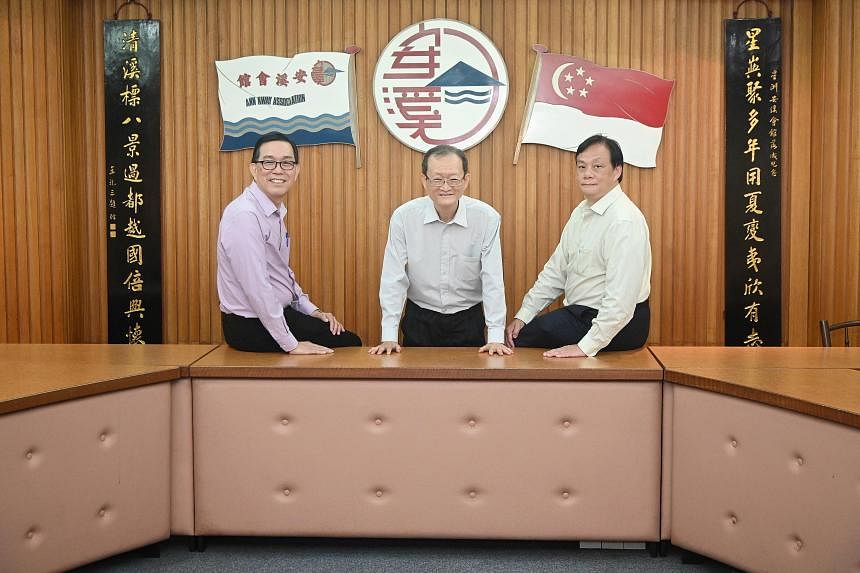
Singapore Ann Kway Association's (from left) general secretary Or Teck Seng, chairman Yeo Hoon Chong and second vice-chairman Poh Po Lian. ST PHOTO: DESMOND WEE

Chin Soo Fang
Senior Correspondent
Sep 18, 2023
SINGAPORE - Alarm bells went off in Mr Yeo Hoon Chong’s head when he was invited to meet three businessmen at their downtown Chinese restaurant three years ago.
The trio, who were from Anxi county, offered to donate funds to the Singapore Ann Kway Association in exchange for honorary titles in the clan association.
Mr Yeo, who chairs the clan association, turned down their offer as membership is open only to Singapore citizens and permanent residents of Anxi ancestry. Honorary titles and committee membership are reserved for those with a good track record and years of contributing to the association, which marked its 100th anniversary last December.
He suspected that the businessmen had offered him the quid pro quo to gain quicker access to local citizenship or permanent resident status. Mr Yeo, 67, said he invited them to join Ann Kway’s monthly lunch sessions instead, but they showed no interest.
Following police revelations of the billion-dollar money laundering case here, some clan association leaders have expressed relief at having kept out questionable characters from their organisations, but also disappointment over the broad-brush characterisation of people who hail from Anxi.
In August, in one of the biggest anti-money laundering operations here, the police arrested 10 foreigners – nine men and one woman aged between 31 and 44 – and have since taken control of more than $1.8 billion in assets.
The group of foreign nationals is allegedly involved in laundering proceeds from organised crime activities overseas, such as scams and online gambling. Several of them originated from Anxi, though they hold passports of different nationalities.
Businessman Wang Quancheng said the involvement of some Anxi people in the money laundering case should not be cause to stigmatise a whole group of people.
The 58-year-old is president of the Hua Yuan Association, which has 6,000 members who are mostly new Singapore citizens and permanent residents from China.
He said a recent report in local Chinese media that described Anxi as a “fraudsters’ home town” had hurt the people of Anxi deeply, including himself and many members of the association who are first-generation immigrants from Anxi.
Anxi county in southern Fujian province is a tea capital known for its Iron Buddha (Tieguanyin) tea.
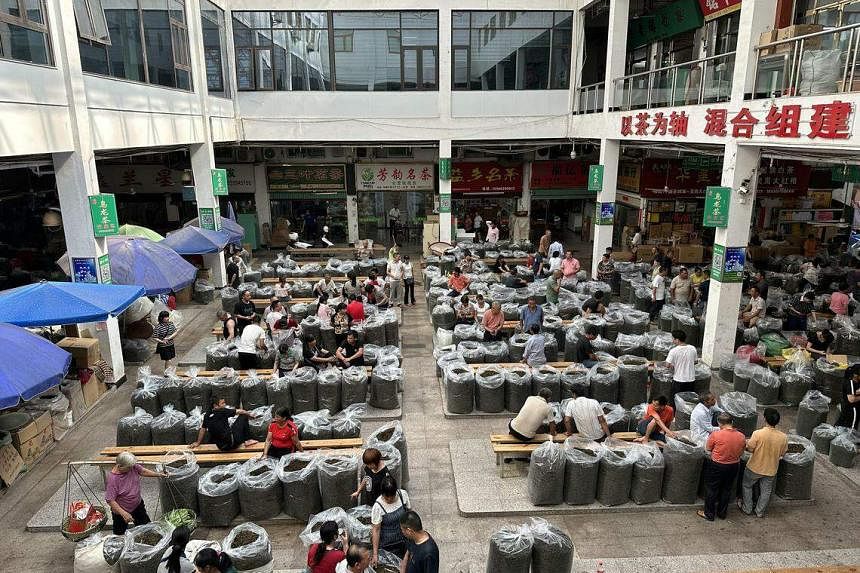
A tea wholesale market in Anxi city centre. ST PHOTO: ELIZABETH LAW
It gained notoriety for cheats masquerading as fortune tellers and businessmen to defraud others in sham business deals, said a 2016 report by the official Xinhua news agency.
Media reports also said Fujian has long been linked to crime, from “snakehead” organisations that smuggled people into the United States by boat in the early 1990s, to telecommunications and online scams in more recent years.
Those of Anxi ancestry form a large part of Singapore’s Hokkiens, which is the biggest Chinese dialect group at around 45 per cent of the Chinese community here.
Ann Kway’s Mr Yeo said it pained him and many members, as well as their counterparts in Anxi, to read reports describing the county as the heart of criminal activities.
He acknowledged that there are occasional attempts to take advantage of those from Anxi who have established themselves in Singapore. About five years ago, another member of Ann Kway was offered some money by a young Anxi native to be a director of his construction firm.
“When the money laundering case hogged the headlines recently, this member said he was relieved that he was not enticed by the dodgy offer then,” he said.
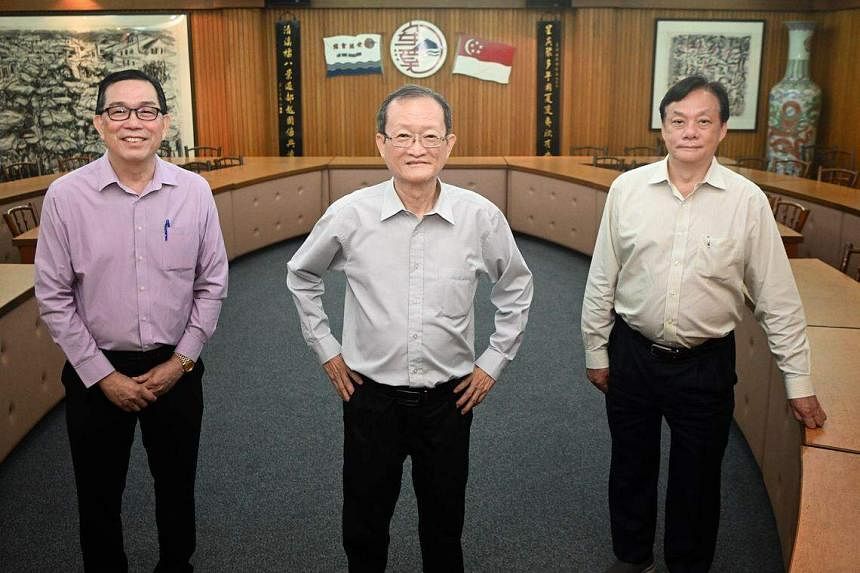
Singapore’s Ann Kway Association committee members said the money-laundering case should not put their ancestral home Anxi in a bad light. ST PHOTO: DESMOND WEE
Many from Anxi have contributed to Singapore for over a century, said Mr Yeo, who is a businessman. This included building over 30 village schools in the early years of independence, and contributing to the building fund of Nanyang University.
Mr Thomas Chua, president of the Singapore Hokkien Huay Kuan, said Singaporean Hokkiens are known for their grit and gumption, and for contributing to Singapore’s modernity, often quietly.
Some famous examples are early pioneers such as Tan Tock Seng, Tan Kah Kee and Tan Lark Sye.
It is understandable that people may appear “protective or even defensive” when negative associations are made about a place they came from, said Dr Lee Wee Heong, head of Chinese studies at the Singapore University of Social Sciences.
That is why reports on topics involving cultural or ethnic groups must avoid perpetuating stereotypes, and respect the complexity of community identities, he said.
“People may feel compelled to protect the reputation of their ancestral home, especially if they believe it’s being unfairly tarnished,” he added.
Last edited:
More charges in billion-dollar money laundering case; $400m in assets seized from 2 suspects alone
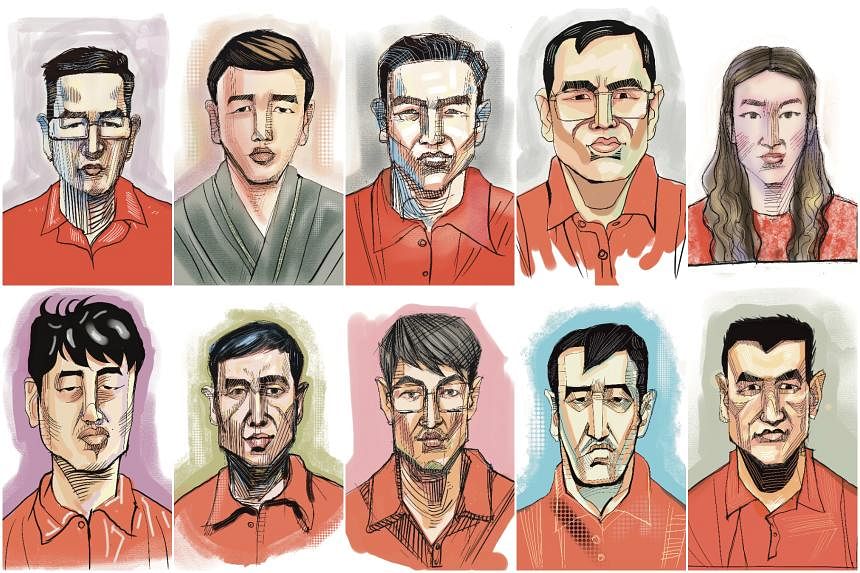
The 10 suspects are (clockwise from top left) Su Baolin, Su Haijin, Chen Qingyuan, Su Wenqiang, Lin Baoying, Zhang Ruijin, Wang Dehai, Su Jianfeng, Vang Shuiming and Wang Baosen. ST ILLUSTRATIONS: CEL GULAPA

Nadine Chua
AUG 31, 2023
SINGAPORE – The suspects in the billion-dollar money laundering case were on Wednesday denied bail amid concerns flagged by prosecutors over possible collusion and third-party interference with investigations.
The prosecution team also drew alleged links to foreign syndicates and assets, overseas gambling activities and fugitives.
The case involves more than $1 billion in assets including properties, cars, and luxury watches and handbags.
In court proceedings, which saw the accused appear via video link, the court heard requests from defence lawyers for their clients to have access to family members, with some arguing that the accused were not flight risks.
District Judge Kow Keng Siong ordered for them to remain in custody, after prosecutors raised concerns over alleged links between the suspects.
Deputy Public Prosecutor Ng Jean Ting noted that in the case of Su Haijin, who was charged with one count of resisting arrest, there was concern over purported links to other individuals who may attempt to impede investigations.
The prosecutor said that assets amounting to $160 million belonging to the Cypriot national and his wife have been seized.
“There are ongoing attempts by third parties to dissipate assets on Su’s behalf. Beyond Su’s connections with the other arrested individuals in this case, these parties may well be prepared, directly or indirectly, to impede in investigations,” added DPP Ng.
The first to appear before the court was Cambodian national Chen Qingyuan, one of the 10 foreigners linked to the alleged billion-dollar money laundering ring. He was handed three more charges on Wednesday.
The charges concern more than $6 million in his bank account, a car valued at more than $1 million, and cryptocurrency, said DPP Ng.
Chen possessed a white Range Rover, which purportedly represents benefits from remote gambling offences.
The DPP sought for Chen, 33, to be remanded for another eight days, adding that the evidence collected shows connections among the 10 people. The DPP added that there is a risk of contamination of evidence and collusion among those involved.
Chen’s lawyer Mark Tan asked for his client to be released on bail.
“He is not a flight risk. His passport has been seized, his family is here and he misses them,” said the lawyer. “He has a wife and three children. The two older ones have been studying here since 2017 and they are integrated here.”
Mr Tan added that there is a “low chance of him reoffending” and that Chen was regularly involved in volunteer work and would like to return to that.
The judge ordered that Chen continue to be remanded until Sept 6, when his case will be heard in court again.
Chen, who was first charged on Aug 16 with one count of benefiting from the ill-gotten gains of criminal activities, is now facing four charges under the same Corruption, Drug Trafficking and Other Serious Crimes (Confiscation of Benefits) Act.
He was the first of the 10 accused to appear in court via video link after their arrests on Aug 15, following an islandwide blitz which involved 400 police officers. Chen was arrested at his condominium in Leonie Hill Road in the River Valley area.
Su Wenqiang
The Cambodian national was handed a second money laundering charge on Wednesday.In 2022, the 31-year-old paid $500,000, which was allegedly from the benefits of criminal conduct, for a Mercedes-Benz car.
Court documents stated that it involved an unlawful remote gambling service based in the Philippines for people in China.
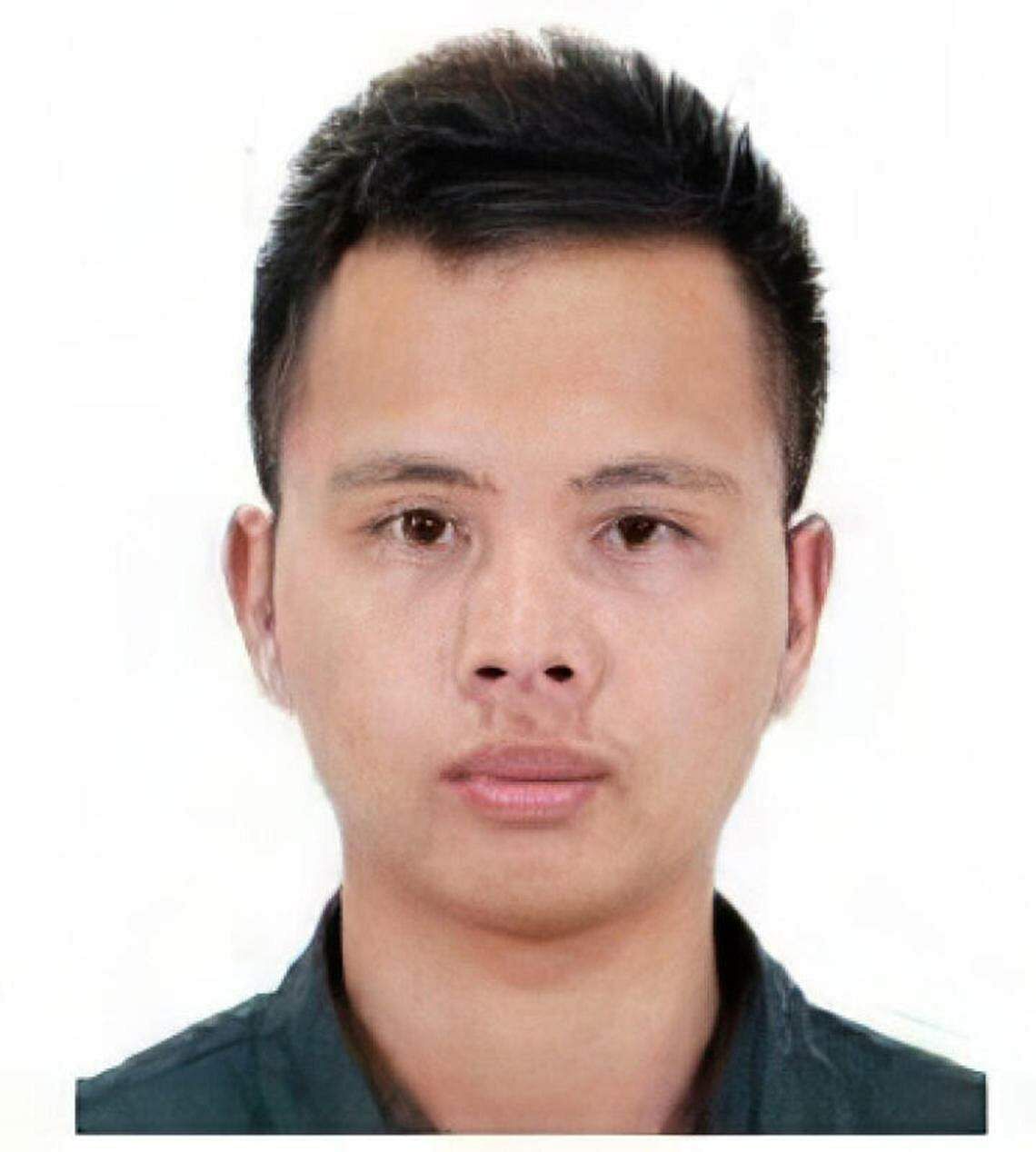
Su Wenqiang was handed a second money laundering charge on Wednesday. PHOTO: CHINA POLICE
Seeking bail for his client, lawyer Nandwani Manoj Prakash said his client, whose wife is in Singapore, has two young children who are enrolled in an international school.
When the judge ordered that he remain in remand, Su requested to speak to the court.
He said in Mandarin: “I am pleading to the court to grant me bail. As long as I can be with my family, I am agreeable to any form of monitoring... I have insomnia, I am unable to sleep well, and I am on the verge of a mental breakdown.”
The judge said Su will be able to speak to his lawyer, but added that he is to remain in remand.
Su Baolin
The Cambodian national, who was handed a second forgery charge, appeared in court via video link from Changi Medical Centre. The 41-year-old has a congenital heart condition.DPP Ng said the seized properties belonging to him and his wife are valued at over $130 million.
The prosecutor made an application for him to remain in remand for eight more days, noting that the risk of collusion and contamination of evidence remains high.
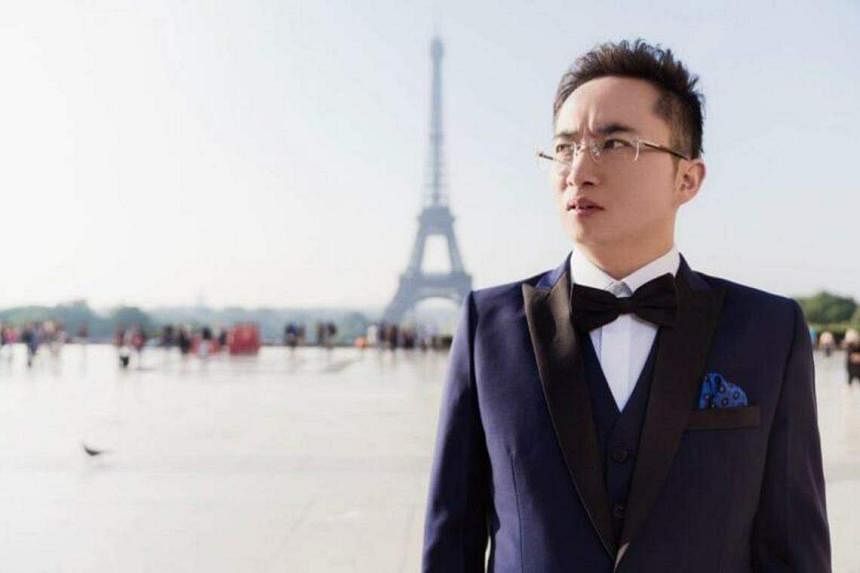
DPP Ng said the seized properties belonging to Su Baolin (pictured) and his wife are valued at over $130 million. PHOTO: CHINA POLICE WEBSITE
Addressing the court, Su’s lawyer Sunil Sudheesan said DPP Ng should not “throw about the term ‘collusion’ so casually”. He said his client and Su Haijin are not brothers.
“Some of the co-accused persons are barely acquaintances. Hence, we cannot bandy about terms like ‘collusion’,” said Mr Sunil.
In response, DPP Ng said: “Investigations so far have strengthened the links between them. They are certainly not mere acquaintances.”
The judge granted the prosecution’s application for Su Baolin to be further remanded.
Mr Sunil told the court that his client has not been allowed to see his wife yet as she is a person of interest in the case.
Wang Baosen
The 31-year-old Chinese national was handed a second money laundering charge on Wednesday.According to court documents, he took possession of a black Toyota Alphard Hybrid Elegance in 2022, which allegedly represents his benefits from criminal conduct.
When the charge was translated to him in Mandarin, Wang said he had borrowed money from relatives to purchase the car.
DPP Gan Ee Kiat said investigations indicate that the source of the funds is tainted, adding that Wang’s wife has a property in Singapore worth around $14 million, as well as bank accounts here and overseas.
“The accused is also connected to an individual on the run, and they are suspected to be involved in a criminal syndicate based in a foreign jurisdiction,” added the DPP.
Wang’s lawyer Adrian Wee noted that the prosecution had argued that there is a prospect of collusion, but did not state why it came to this conclusion and who the accused may be colluding with.
In response, DPP Gan said: “There have been new leads since the case was last heard in court. We have stated what we know in general terms without identifying anyone.
“The fact that we did not identify them does not mean we have no evidence, and it does not mean there is no prospect of collusion.”
He added: “I can state generally that the leads identified have partially come from the accused people themselves.”
Wang has been further remanded and is expected to return to court in September.
Lin Baoying
The only woman arrested in the anti-money laundering raids, Lin was charged with forgery on Aug 16.On Wednesday, the 43-year-old Chinese national was handed a second forgery charge, and a charge of perverting the course of justice.
DPP Ng said the authorities seized assets belonging to Lin worth around $200 million – one of the highest amounts among the 10 accused.
Defence lawyer Loo Choon Chiaw said his client, who holds an employment pass, has been in Singapore since 2019, adding: “She has clearly shown the intention that she’s making Singapore her permanent home.”
He said his client started a food and beverage chain in 2023 called Ban Tian Yao and has two children, including a daughter who is studying in a university overseas.
Mr Loo added that Lin’s son and sister were in court to support her.
She will also remain in remand.
Su Haijin
The 40-year-old appeared in court via video link from Changi General Hospital (CGH). He had suffered injuries while allegedly trying to escape on Aug 15.Su, who has been charged with one count of resisting arrest, was not handed new charges on Wednesday. DPP Ng said that the accused is recovering after surgery on Monday. Su fractured his hands and legs after jumping from the second-floor balcony of his home. He was allegedly found by the police hiding in a drain.
Addressing the court on his client’s behalf, defence lawyer Julian Tay said: “My client did not resist arrest. He fell from his balcony, suffered fractures and was found in the drain. He was, at best, evading arrest.”
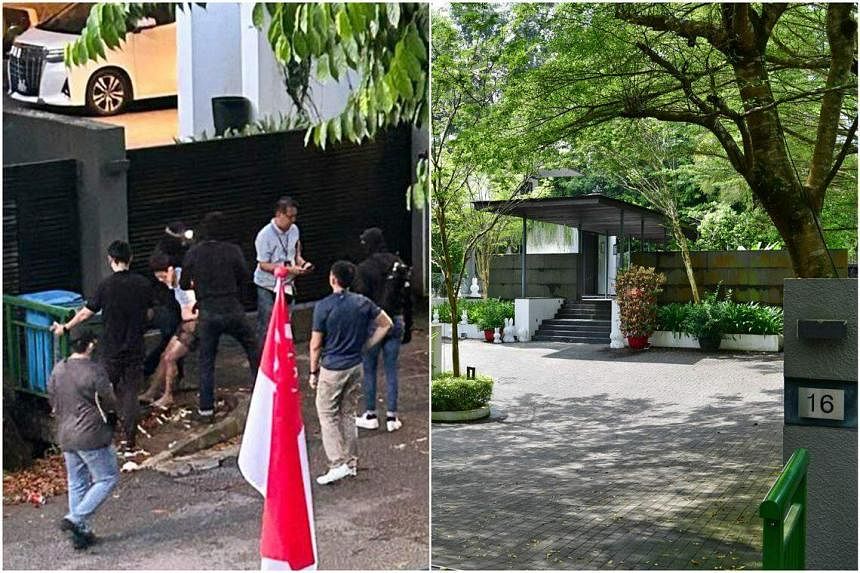
Su Haijin was allegedly found by the police hiding in a drain outside his residence at 16 Ewart Park after he had jumped from a second-storey balcony, PHOTOS: ST READER, ST FILE
Mr Tay added: “I have been instructed that my client has no real connection with the rest, and that his business is his own.”
The judge ordered Su to be remanded in Changi Medical Centre upon his discharge from CGH.
Wang Dehai
Wang, a 34-year-old Cypriot national, was handed a second charge under the Corruption, Drug Trafficking and Other Serious Crimes (Confiscation of Benefits) Act on Wednesday, and will remain in remand.Court documents relating to the new charge stated that Wang had purchased a condominium unit in Paterson Hill for $23 million, by using money that was in part purportedly the benefits from criminal conduct.
DPP Gan said assets belonging to Wang, which have a combined value of around $43 million, have been seized.
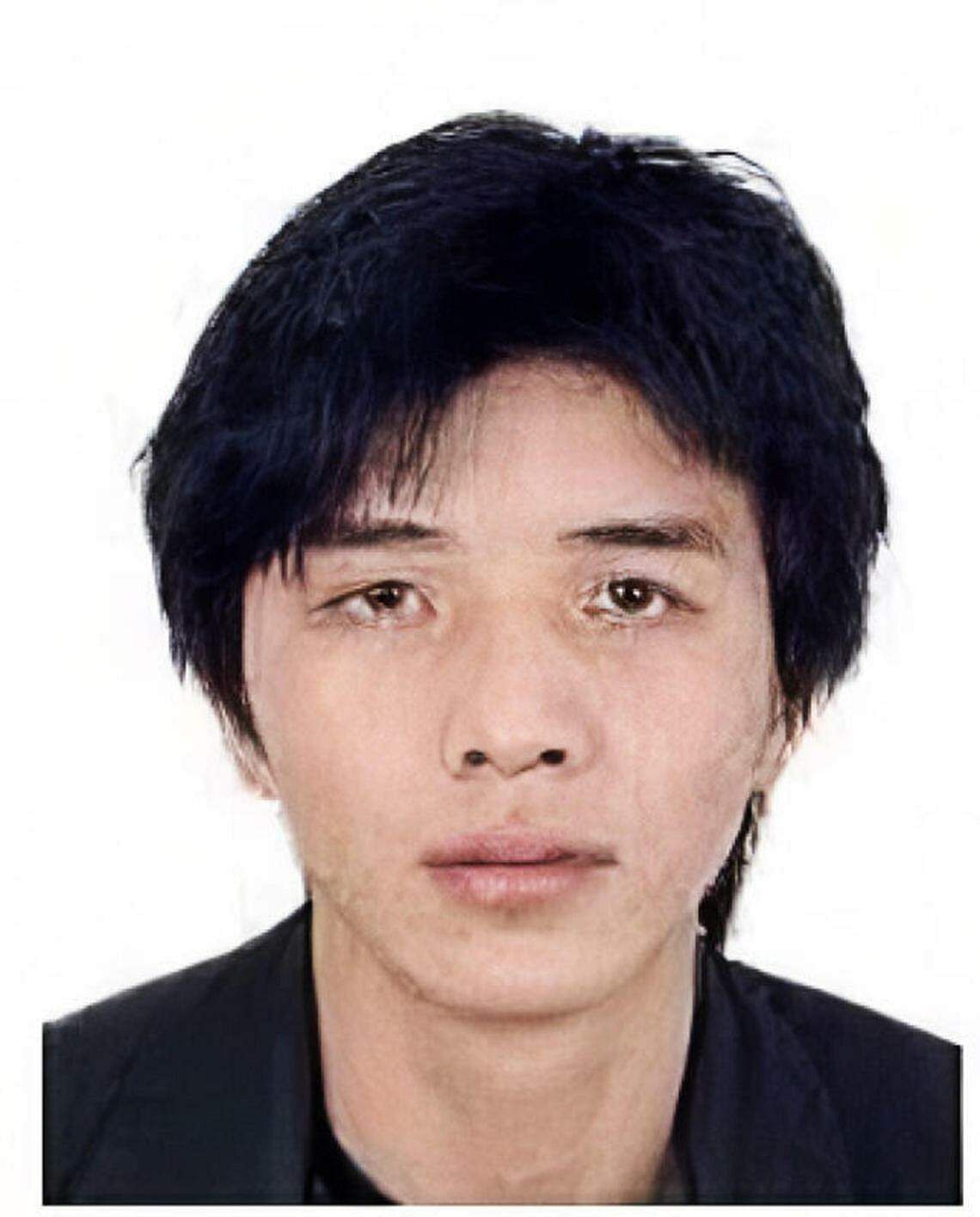
Wang Dehai had purchased a condominium unit in Paterson Hill for $23 million, said court documents. PHOTO: CHINA POLICE
This includes $18 million in his bank account, which the authorities suspect to be tainted.
“He also has properties overseas worth around $4 million, which he derives significant rental income from,” said the DPP.
The prosecutor said Wang should remain in remand, adding: “Should he not be remanded, there is a real risk that evidence, which shows the true scope of his offending, is destroyed through collusion or contamination.”
Defence lawyer Megan Chia sought bail for her client, noting that his passport has been confiscated and that all the assets belonging to him and his wife have been frozen.
DPP Gan disagreed and noted that only their assets in Singapore, and not those overseas, have been frozen.
When Ms Chia suggested a no contact order for her client, to prevent him from reaching out to those involved in the case, the DPP said: “At the end of the day, these are orders. They can be breached and the risk to investigations is a very real one.”
Su Jianfeng
Su, 35, was handed three more money laundering charges, bringing his total to four.DPP Foo Shi Hao said $17 million in cash belonging to Su, which was found in three safe deposit boxes, allegedly represent benefits from criminal conduct.
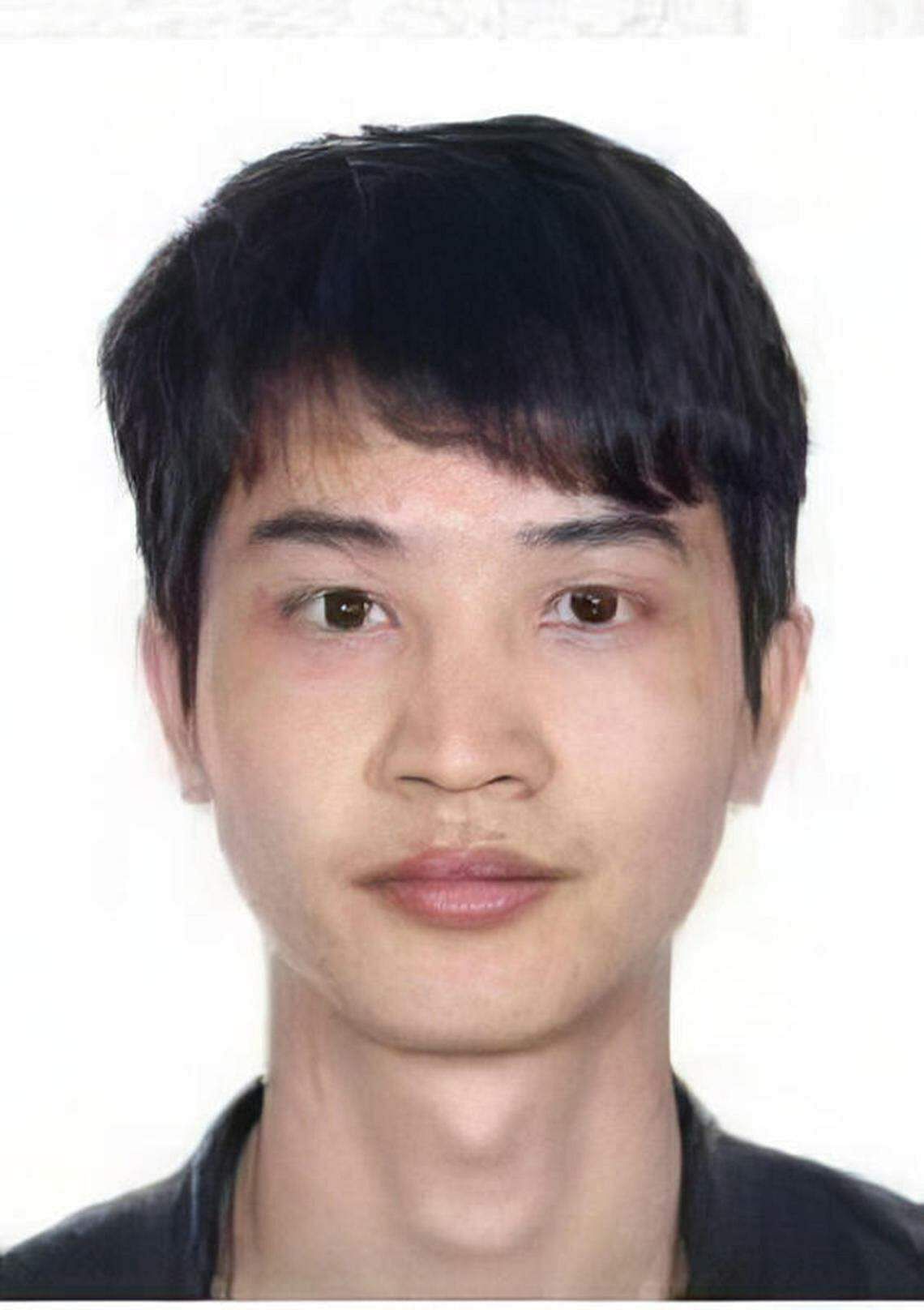
Su Jianfeng was handed three more money laundering charges, bringing his total to four. PHOTO: CHINA POLICE WEBSITE
He added that the authorities would require time for further investigations, and made the application for Su, a Vanuatu national, to be further remanded as he has been linked to one of eight fugitives from Singapore. The police previously said in connection with the case that eight people are on the run and have been placed on a wanted list.
The judge granted the prosecution’s application, and Su will be remanded for eight more days.
Zhang Ruijin
Zhang, 44, was handed two fresh charges of forgery, bringing the total to three.The Chinese national, who was in earlier proceedings described as Lin Baoying’s boyfriend, allegedly forged documents in 2020 with the intent to cheat CIMB Bank.
DPP Foo said the value of the assets belonging to the couple amounts to more than $280 million.
Defence lawyer Loo Choon Chiaw, who is also representing Lin, asked for his client to be released on bail.
He said Zhang has been in Singapore since 2011 and set up a family office in 2020.
“He has been active in doing charity work, and has been making donations to local charities... The couple had a permanent plan to have Singapore as their home,” said Mr Loo, who added that Zhang’s elder brother was in court to show his support.
Zhang will be further remanded.
Vang Shuiming
The last to appear was the 42-year-old Turkish national, who is also known as Wang Shuiming.He was slapped with four money laundering charges, which involve him allegedly possessing criminal benefits from an unlicensed moneylending business in China.
On Aug 16, he was charged with one count of using a forged document.
DPP Foo said assets worth around $200 million were seized from Vang, adding that police require more time because of the sheer number of items.
The DPP said Vang is linked to an individual connected to the case, who is on the run, and the fugitive’s spouse.
The couple, whose identities were not mentioned in court, have assets worth over $300 million, added the prosecutor.
Defence lawyer Wendell Wong said his client, who is asking to be released on bail, has provided the police with 13 statements and has denied any wrongdoing.
Mr Wong added that the authorities would still be able to continue with investigations even if Vang is no longer in remand.
Addressing this point, DPP Foo said: “There is a risk of collusion in this case, in relation to the subject I have mentioned who is linked to Vang.
“There is an incentive for Vang, the subject, and the subject’s spouse to collude in relation to their assets, which are worth a total of half a billion.”
While the judge denied bail for Vang, he gave permission for him to meet his lawyer and his family, subject to the Commercial Affairs Department’s operational considerations.
Several of the accused were arrested at their homes in good class bungalows and high-end condos across Singapore. The operation saw about $1 billion in assets seized, frozen or issued with prohibition of disposal orders. The order prevents the sale of assets.
The assets, which were owned by the individuals under investigation or by companies and people linked to them, include 105 properties worth $831 million.
The properties comprise seven detached bungalows in Sentosa Cove, 79 condominium units and 19 commercial or industrial spaces.
32 parliamentary questions on money laundering case to be answered in ministerial statement in Oct
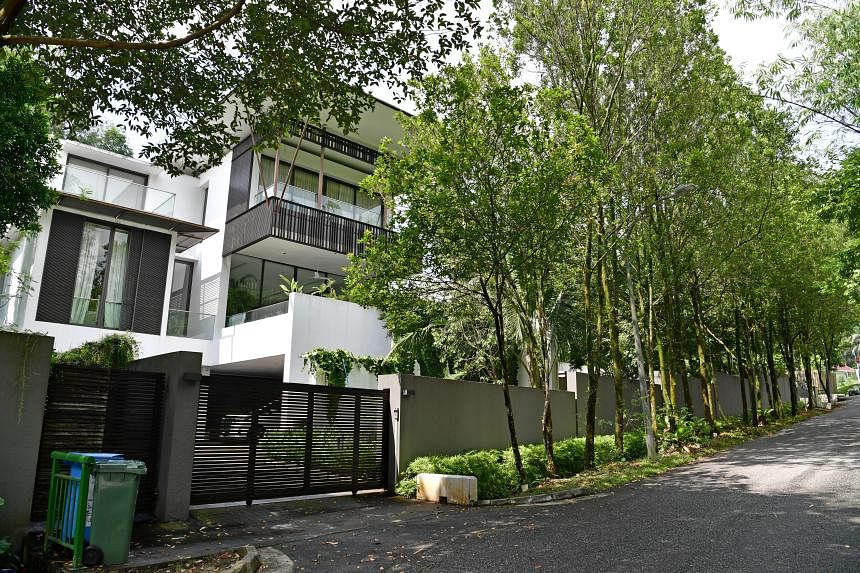
Ten foreigners – nine men and one woman – were charged on Aug 16 with offences including money laundering, forgery and resisting arrest. PHOTO: ST FILE

Nadine Chua
SEP 19, 2023
SINGAPORE – In a rare move, 32 questions on the $1.8 billion money laundering case submitted in Parliament on Monday will be deferred and answered in a ministerial statement in October. The questions were supposed to be addressed on Monday.
Minister of State for Home Affairs Sun Xueling told Parliament that many MPs had filed questions on the anti-money laundering operation conducted by the police and on Singapore’s anti-money laundering framework.
She said the queries covered a wide range of issues across several ministries. She sought permission from Speaker of Parliament Seah Kian Peng for the Ministry of Home Affairs (MHA), together with other ministries, to respond to the queries comprehensively in a ministerial statement in October.
The 32 questions had been set for oral replies, while another 11 were to be addressed via written answers.
Mr Zulkifli Baharudin, a former Nominated MP, told The Straits Times that the deferment of this many questions was rare, and he could not remember the last time when so many questions were set to be answered in a ministerial statement.
He said: “This matter is still under police investigation, and because of the severity and public interest in this case, there cannot just be a holding statement given in Parliament.”
A ministerial statement would allow questions to be addressed in a comprehensive way, he said.
Mr Zulkifli, who was NMP from 1997 to 2001, added: “It is a good move by the ministries as this case has wide implications, and it is very difficult for the Government to just respond to questions without being very deliberate and careful in handling the issues various constituents have raised.”
The slew of questions from MPs comes after 10 foreigners – nine men and one woman – were charged on Aug 16 with offences including money laundering, forgery and resisting arrest.
Aged 31 to 44, they were originally from China and are now of various nationalities.
The police had said 105 properties, estimated to be worth $831 million, were issued with prohibition of disposal orders in relation to the case. These included seven detached bungalows in Sentosa Cove and 79 condominium units.
MPs wanted to know what measures Singapore used to detect money laundering and prevent it from happening here.
Ms Foo Mee Har (West Coast GRC) asked how the Government will step up checks on those from high-risk “golden passport” jurisdictions and if anti-money laundering laws here needed to be tightened.
A golden passport is one granted by a country in exchange for a big investment or a donation.
More than 100 nations, including Vanuatu and Turkey, currently offer citizenship or long-term residency in exchange for such investments or donations.
Two of the accused are nationals of these countries. Su Jianfeng, 35, is a Vanuatu national, while Vang Shuiming, 42, is a Turk.
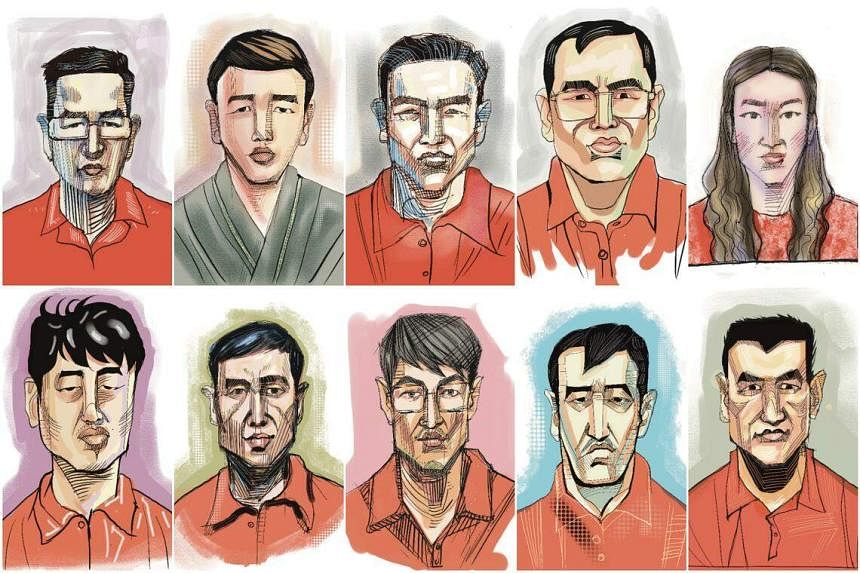
The 10 accused are (clockwise from top left) Su Baolin, Su Haijin, Chen Qingyuan, Su Wenqiang, Lin Baoying, Zhang Ruijin, Wang Dehai, Su Jianfeng, Vang Shuiming and Wang Baosen. ST ILLUSTRATIONS: CEL GULAPA
Mr Patrick Tay (Pioneer) asked what more can be done to prevent individuals under false identities or those with criminal intent to conduct cross-border organised crimes from obtaining work, employment or dependant passes.
Mr Melvin Yong (Radin Mas) asked how many individuals have held directorial and secretarial roles in more than 100 companies concurrently in the past five years. He also asked if MHA will consider imposing a statutory limit on the number of companies a person can hold directorial and secretarial roles in.
On Sept 3, ST reported that the listing of a Singapore resident as director, secretary and shareholder of 185 companies here had sparked concerns, after it emerged that several of the firms were linked to three of the accused.
Mr Louis Chua (Sengkang GRC) asked what processes the Singapore Land Authority (SLA) has in place before granting foreigners approval to purchase landed residential properties in Sentosa Cove and if the SLA will review its processes for conducting such checks.
Two of the accused, Chinese national Zhang Ruijin, 44, and his lover Lin Baoying, 43, reside at a bungalow at Pearl Island in Sentosa Cove.
On Aug 15, the police conducted a massive islandwide blitz, hitting several good class bungalows and high-end condos across Singapore.
The operation involved more than 400 officers led by the Commercial Affairs Department.
On Sept 13, in arguing against bail for Cypriot national Su Haijin, who is one of the accused, the prosecution said this was one of the most serious, if not the worst, money laundering cases in Singapore.
Cash, assets seized and frozen in S’pore’s worst money laundering case now worth over $2.4b
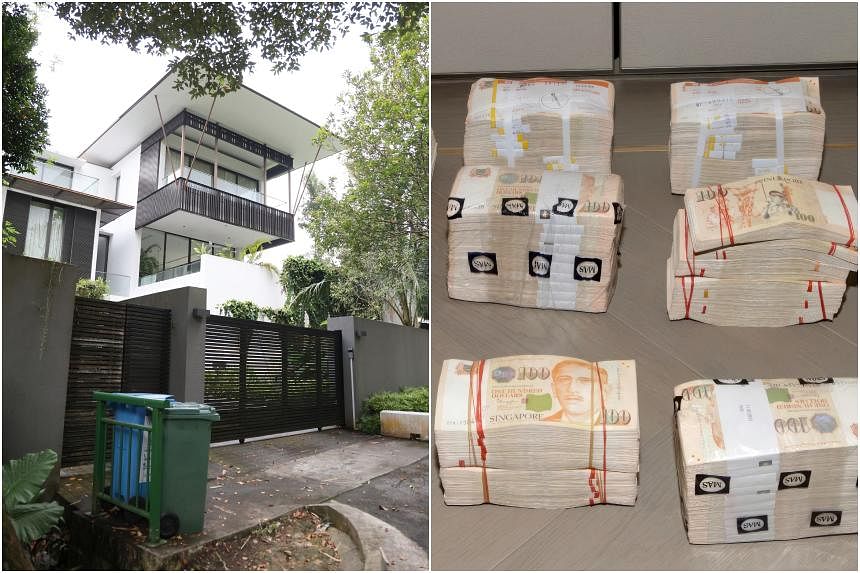
The police said on Wednesday they conducted more operations after 10 foreign nationals had been arrested for their alleged involvement in the money laundering probe. PHOTOS: SHIN MIN DAILY NEWS, SINGAPORE POLICE FORCE

Nadine Chua
SEP 20, 2023
SINGAPORE - The police have taken control of more than $2.4 billion worth of assets in Singapore’s worst money laundering case.
In an update on Wednesday, the police said they conducted more operations, after 10 foreign nationals were arrested in August for their alleged involvement in laundering the proceeds of their overseas organised crime activities.
These included scams and online gambling activities.
The police said that during these operations, additional assets were seized and issued with prohibition of disposal orders.
The police seized bank accounts with a total estimated value of more than $1.127 billion.
Cash, including foreign currencies, amounting to over $76 million was also seized.
Other confiscated items include 68 gold bars, 294 luxury bags, 164 luxury watches, 546 pieces of jewellery, cryptocurrencies worth more than $38 million, and 204 electronic devices such as computers and mobile phones.
Prohibition of disposal orders were also issued against more than 110 properties and 62 vehicles worth more than $1.242 billion, as well as bottles of liquor, wine and multiple ornaments.
The orders mean the accused cannot sell these items.
On Aug 15, the police conducted a massive islandwide blitz involving over 400 officers led by the Commercial Affairs Department, simultaneously hitting several good class bungalows and high-end condominiums across Singapore.
Nine men and one woman were arrested and charged the next day with various offences including money laundering, forgery and resisting arrest. Aged 31 to 44, they were originally from China and are now of various nationalities.
Since their arrests, they have appeared in court via video link several times.
The prosecution has argued against bail for the 10, citing a risk of contamination of evidence and collusion among them.
The Straits Times reported on Aug 28 that investigators were also looking at 24 people linked to the accused, with the police digging into assets they own and businesses they are involved in.
The Ministry of Law sent a notice on Aug 27 to dealers of precious metals and stones to check against their records for possible suspicious transactions by these 24 individuals.
In a subsequent hearing in court, the prosecution revealed the suspects included wives and relatives of the 10 accused.
Founder of Chinese gambling website linked to S’pore’s $2b money laundering case
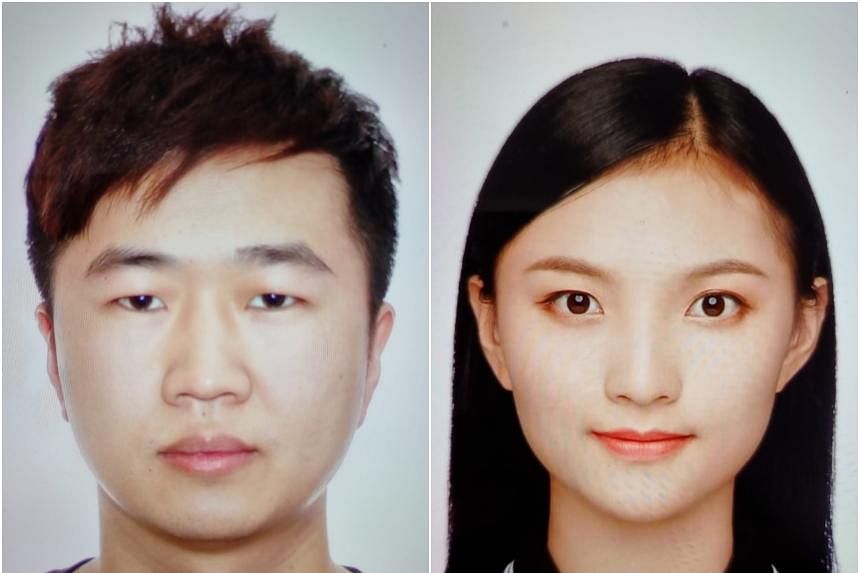
Wang Bingang (left) and Wang Liyun, who is believed to be his wife, have not been seen for about a month. PHOTOS: ST READER
Christine Tan
SEP 25, 2023
SINGAPORE - A man who made millions offering illegal online gambling services to players in China is among a number of individuals who avoided arrest in Singapore during the Aug 15 anti-money laundering blitz.
Wang Bingang formed his group in 2012 when he was only 23 years old. In two short years, the young man from Anxi, Fujian, started churning out millions by running the Hongli International gambling site from the Philippines and Cambodia. Hongli means “great profits” in Mandarin.
Wang, now 34, was living in a good class bungalow in Rochalie Drive in Tanglin, which he rented with Wang Liyun, believed to be his wife, when Singapore police arrested 10 foreigners.
His family and helper continue to live at the address.
When The Straits Times (ST) visited the bungalow last Thursday, the metal gate of the two-storey house was wide open, revealing two Toyota Alphards and a Rolls-Royce in the front yard.
Their domestic helper, who has been working for the family for a year, insisted the couple are in Singapore, but were not at home at the time. But others said the pair, who would throw parties at the house every month or so, have not been seen for about a month.
Checks showed that in 2022, Wang Bingang signed up with Sentosa Golf Club, where foreigners have to pay about $950,000 to join as a member.
A Sept 12 notice at the club showed that he, along with five others linked to the investigation in Singapore, had been put on a defaulters’ list, which means he has not settled his accounts there.
He does not show up in business records, but Wang Liyun has interests in several businesses, including a bridal shop.
The pair are on a list of 34 names, which the Ministry of Law sent on Aug 27 to dealers of precious metals and stones to flag for suspicious transactions that may involve money laundering. The list includes the names of the 10 arrested here in the operation, including an individual who is said to be Wang Bingang’s relative.
Assets seized and frozen in the money laundering case here have swelled to $2.4 billion.
In court hearings, police said that one of the accused individuals, 31-year-old Chinese national Wang Baosen, is the cousin of a fugitive they identified as Subject Y.
Wang Baosen, who prosecutors said is linked to a criminal syndicate overseas, is currently facing two money laundering charges here relating to monies from illegal remote gambling.
Police said more than $100 million worth of assets in Singapore belonging to Subject Y have been seized or issued prohibition of disposal orders.
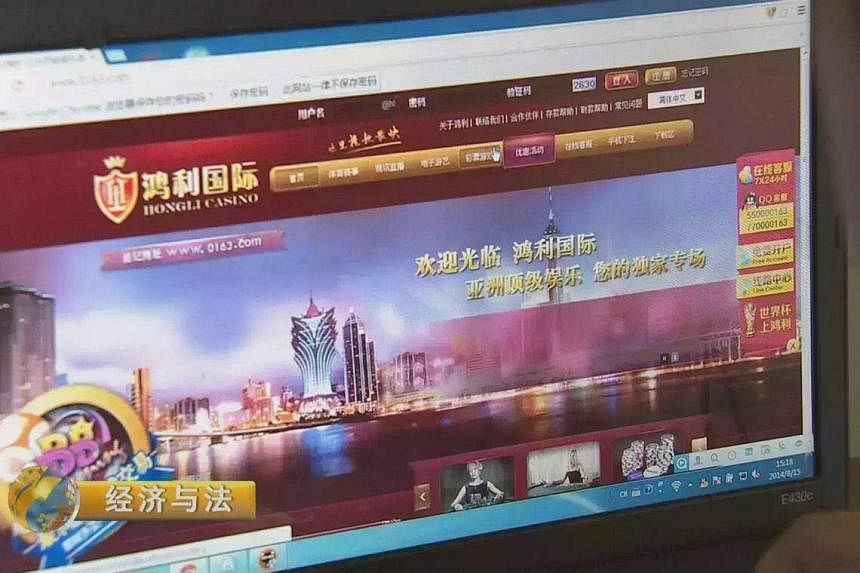
The Hongli International gambling site as seen in 2014. It targeted players in China, where online gambling is illegal. PHOTO: PEOPLE’S PROCURATORATE OF TONGSHAN DISTRICT, XUZHOU CITY
Operated in Philippines
ST examined various documents, including court papers from Wang Bingang’s conviction in China, to trace his rise.The Hongli group’s reach was also detailed in Chinese media reports and by organisations such as the United States Institute of Peace (USIP), an American federal institution established by the US Congress in 1984.
Wang Bingang set up the Hongli International gambling site with two associates, including fellow Anxi native, 25-year-old Wang Cailin.
They were among the pioneer Philippine offshore gambling operators, known colloquially as Pogos, to set up an online gambling firm in the country. Like the others, they targeted gamblers all over China, where online gambling is illegal.
The flashy site offered games such as blackjack and baccarat, and provided sports and e-sports betting services. Gamblers could also become promoters and earn a commission by inviting other players to the platform.
The business turned a profit quickly, but the authorities in the Philippines started cracking down on online gambling firms amid reports of violent criminal activities, including kidnapping and murder.
In 2014, Wang Bingang moved his operations to Bavet in Cambodia and recruited a man named Wang Xiaolong into the business. Wang Baosen was allegedly also roped in, according to media reports.
Hongli was a well-oiled machine, complete with graphic designers, and customer service and finance management staff. It grew rapidly and soon became the largest gambling website in Bavet, which borders Vietnam.
With Beijing putting tackling corruption centre stage, the authorities in China started clamping down on online gambling activities. In July 2014, a customer of Hongli’s surrendered himself at a police station in Ma’anshan city in Anhui province after going bankrupt.
This started a chain of events that led to Wang Bingang’s arrest, according to an article published on the official WeChat page of the People’s Procuratorate in Tongshan district in Xuzhou city.
The article is based on a 2015 documentary on the Hongli case by Chinese broadcaster CCTV. The documentary is currently unavailable on the broadcaster’s page.
According to the article, the police investigated bank accounts listed on the site that received bets and sieved through transaction data to arrest promoters of the site. Through follow-up interviews, they identified Wang Cailin.
He was on a trip from Cambodia to Xiamen, China, to introduce his pregnant girlfriend to his parents when the police arrested him on Nov 26, 2014. He was tight-lipped at first, but eventually revealed the identity of the group’s head honcho – Wang Bingang.
Wang Bingang, who is a Chinese national but has Cambodian citizenship, was hiding in the Tian Tian Fishing Port hotel in Bavet in February 2015 when the police came looking for him. Wang Xiaolong was with him.
As online gambling was legal in Cambodia at the time, Chinese police were not allowed to storm the building and could only wait for the elusive headman to leave.
Describing the waiting game, the article said in Mandarin: “Wang Bingang and his associate seemed to have felt the tense atmosphere outside the hotel and refused to leave, even after half a month.
“As Chinese New Year was around the corner, (investigators) were contemplating: Should they continue waiting or temporarily retreat? Everyone was worried.”
He finally stepped out for a meal and was arrested on Feb 16, 2015. He was repatriated to China on Feb 25.
The investigations by the police in China stretched over seven months. They froze 487 gambling accounts, and found that the illicit proceeds from over just six months was a whopping 984 million yuan.
Key players including Wang Cailin and Wang Baosen had a monthly 10,000 yuan salary, along with a cut of the site’s profits, according to court documents from the Ma’anshan city district court where the case was heard.
Wang Bingang pocketed two million yuan in total from the scheme.
Prosecutors said that to evade the law, the suspects used different mobile phones for work and their personal life, tapped different online accounts, and regularly changed the Skype username they used for communicating and giving commands.
In court, Bingang’s lawyer claimed his client did not qualify as the headman of a criminal organisation.
The court said Hongli cannot be counted as a “criminal organisation” as it was not structured, and Bingang could not be indicted as a headman but only as the main perpetrator of a crime.
On Aug 26, 2015, he and five of his associates were found guilty. They were given jail sentences of between 10 months and three years, and slapped with fines of between 50,000 and three million yuan.
Wang Bingang was handed a three-year jail term, which was to end on Feb 15, 2018. Wang Baosen was investigated in relation to the case, but there is no information about his court trial or sentence.
Despite the crackdown eight years ago, Hongli International appears to still be operating.
Mr Jason Tower, country director for the Myanmar programme at USIP, said Hongli has been a known name in the illegal gambling industry for some years.
He added that it still has active online gambling platforms accessible via social media links.
“You can find many online gambling links that go back to Hongli... they come and go, they seem to be taken down or the websites become defunct very quickly, but a new one will always emerge,” said Mr Tower, who has more than 20 years’ experience working on conflict issues in South-east Asia.
Checks by ST found that the site’s name has appeared in at least 15 X (formerly Twitter) posts from 2016 to 2022. These posts state various website addresses that are linked to gambling sites with different names.
Another gang
The Hongli gang is not the only foreign syndicate linked to investigations in Singapore. The police are also exploring the connection between some of the 10 arrested here and the Heng Bo Bao Wang group.One of those arrested here, Vang Shuiming, 42, is said to be a known associate of the syndicate. Vang currently faces one forgery charge and four money laundering charges in Singapore.
The police said the Turkish national, who is also known as Wang Shuiming, had communicated with a Suspect X, who is no longer in Singapore, about illegal activities.
The police did not identify Suspect X, but said he is wanted in connection to the ongoing probe, and in China for online gambling activities.
The Heng Bo Bao Wang gambling syndicate was busted in May 2022, in an operation that saw Shandong police arrest 131 people and seize more than 10 million yuan (S$1.87 million) in assets.
The group, which had a base in Cambodia, had developed and maintained several online casinos, and either provided the services directly or leased the gambling services out to others to run.
Vang’s brother, Wang Shuiting, is among nine members of the Heng Bo Bao Wang gang who are on the run from the authorities in China. The brothers have Cambodian citizenship.
In an Aug 15 notice, the police in China urged the nine to return to the country, saying that if they did so voluntarily before Oct 10, 2023, they may be granted leniency.
The others on the list of wanted people allegedly include Vang, who the Singapore police said is closely associated with two of the 10 accused – Su Haijin and Su Baolin.
Online gambling in China grew at an astonishing rate amid the Covid-19 pandemic.
In 2021, the country’s Ministry of Public Security said the police probed more than 17,000 cases of cross-border gambling and arrested over 80,000 suspects in cases that involved more than one trillion yuan in illegal transactions.
It also smashed more than 2,200 online gambling platforms, 1,600 illegal payment platforms and underground banks, and 1,500 gambling promotion platforms that same year.
Last edited:
damn satki lor. i also want to learn how to wash moneyThese assets include 152 properties and 62 vehicles with an estimated value of more than $1.24 billion, money in bank accounts amounting to more than $1.45 billion, and cash of various currencies worth more than $76 million.
Money laundering: Scammers set up companies and bank accounts in S’pore remotely during Covid-19
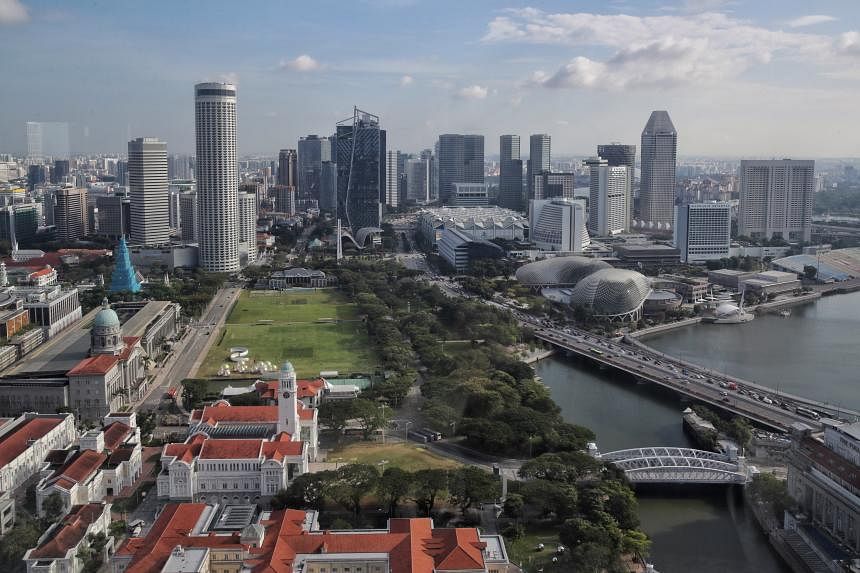
In total, the scammers moved $4.65 million in 2020 – money which they had stolen from companies based overseas. ST PHOTO: GIN TAY
Christine Tan
SEP 27, 2023
SINGAPORE – Scammers were able to set up firms in Singapore and move their ill-gotten gains to bank accounts here by exploiting relaxed rules that allowed the registration processes to be conducted remotely during the Covid-19 pandemic.
In total, they moved US$3.4 million (S$4.65 million) – money they had stolen from companies based overseas – to Singapore in 2020.
On Monday, Chinese national Liang Jiansen, who helped the scammers register companies here, was fined $9,000 for offences under the Companies Act.
The 33-year-old permanent resident pleaded guilty to two counts of failing to exercise reasonable diligence in his duty as a director, with one similar charge taken into consideration for sentencing. It was not stated in court documents whether the scammers were caught.
Deputy Public Prosecutor Vincent Ong said Liang, an accredited accountant who moved here in 2015, opened a corporate secretarial firm in 2020 because he heard the business was profitable.
His firm, Yuansen Business, charged $800 for a package which included providing a nominee director, corporate secretarial services and a registered company address. Clients had to pay an extra $100 to $150 if a bank account was required for the firm.
Most of the clients were from China, with Liang often registering himself as director. He did this to fulfil the statutory requirement for a locally resident director.
As at January 2021, he was a director of 135 companies in Singapore.
DPP Ong said Liang worked with agents who referred Chinese nationals to him. Some time in August 2020, one of them referred a client to set up a company in Singapore.
The agent provided identification documents and a passport purportedly belonging to the individual and Liang incorporated the company, Xin Yang Wu, on Aug 9, with him as one of the directors and secretary.
Mail for the company was sent to Yuansen’s office. Another agent later contacted Liang and told him to open two bank accounts for Xin Yang Wu – one for US dollars and the other for Singapore dollars – with UOB.
The bank later sent Liang a letter to open accounts for the company, which he signed and returned.
Liang had taken similar steps to incorporate another firm, Zheng Yan, and opened a bank account for it at UOB that same month.
DPP Ong said large sums of money were transferred to the accounts soon after.
One of the victims was German company Gasfin Development. Between Oct 25 and Nov 9 that year, the company received e-mails purportedly from a supplier asking for payment.
Gasfin transferred $44,055 to Xin Yang Wu’s Singapore dollar account, thinking it was made to the supplier. Of the sum, $43,028 was later transferred to Xin Yang Wu’s US dollar account and then to a bank account in China.
On Oct 30 that year, American firm Northern Trust Company Chicago fell for a similar scam and transferred US$3 million (S$4.1 million) from its client’s account to Xin Yang Wu’s US dollar account.
DPP Ong said the police here managed to seize the stolen sum in Xin Yang Wu’s US dollar account before it was routed away.
On Nov 2, American company Examinetics fell victim to a similar ruse and transferred almost US$350,000 to Zheng Yan’s US dollar account. The police in Singapore were able to seize US$250,403.01 in the account.
DPP Ong said the purported Chinese nationals who set up Zheng Yan and Xin Yang Wu were not in Singapore when they exploited the know-your-customer (KYC) processes, which were conducted remotely during the pandemic.
The KYC steps were introduced to combat the threat of money laundering and fraud. They require financial institutions and corporate service providers, among other entities, to verify the identity of customers and staff.
The prosecutor said that in the cases of Xin Yang Wu and Zheng Yan, Liang never met his clients and did not know anything about the companies’ business activities, beyond that they were involved in “wholesale trade”.
He added that Liang’s background checks on clients were limited to doing simple online searches to see if they were linked to criminal investigations.
As a result, he failed to exercise supervision over the companies’ affairs, and to check the companies’ transactions, review bank statements and inquire what the bank accounts were to be used for.
However, the prosecutor said Liang was negligent, instead of reckless, as it was not shown that he knew in advance about the companies’ involvement in fraudulent transactions.
The starting point for purely negligent breaches of duty is a fine, without a jail term, said the prosecutor.
“It is almost impossible to exhibit greater negligence as a director than the accused did in this case, having absolutely washed his hands clean of the affairs of the company,” said DPP Ong.
“The accused knew nothing and did nothing and was content to remain in his ignorance.”
Checks against business records on Tuesday show that Xin Yang Wu and Zheng Yan are still listed as “live” companies. The two Chinese nationals Liang helped to set up the companies remain as directors.
The Accounting and Corporate Regulatory Authority (Acra) said Liang and his firm are no longer allowed to provide corporate secretarial services or help others set up companies here. It added that his registration as a qualified agent and Yuansen Business’ registration as filing agent were cancelled on Feb 28, 2023, as a result of his conviction on Jan 9 over a separate matter.
Liang had made a false filing with Acra that his employee was appointed as director of a firm known as Roto Textile. His employee did not consent to it and was not aware of the appointment.
For this offence, Liang was fined $10,000.
Jobless S’porean named as director of 186 companies; scammers used one firm to launder $3.2m
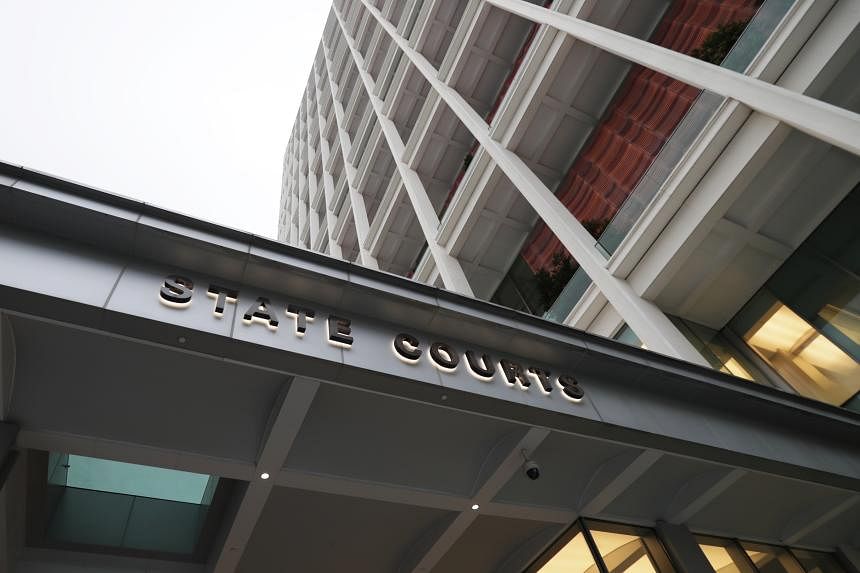
Er Beng Hwa was fined $4,000 after he pleaded guilty to one charge of failing to exercise reasonable diligence in his duty as a director. PHOTO: ST FILE
Christine Tan
SEP 27, 2023
SINGAPORE - A jobless Singaporean who became nominee director of 186 companies here was on Wednesday fined for failing to exercise reasonable diligence in his duty as director, the second person in three days to be taken to task for the offence.
Singaporean Er Beng Hwa got to know a Chinese national in 2020 during the Covid-19 pandemic, who offered him $50 a year for each firm incorporated here in which he was named as nominee director.
The 49-year-old was promised another $50 each time he opened a bank account for the firms, and if he had to turn up to sign papers.
One of the firms was later used by scammers to launder a total of US$2.36 million (S$3.23 million) from victims overseas.
Er, also known as Adrian, was fined $4,000 after he pleaded guilty to one charge of failing to exercise reasonable diligence in his duty as a director. He was also disqualified from being a company director for three years.
Another similar charge involving a separate company was taken into consideration during sentencing.
On Monday, Chinese national and permanent resident Liang Jiansen was fined $9,000 under the same Companies Act and disqualified from being a company director for four years.
The 33-year-old, who ran a corporate secretarial firm, was director of 135 firms.
In an earlier press release, the police said 12 individuals in all had inadvertently helped scammers launder more than US$36 million through Singapore bank accounts.
The losses were from local and overseas victims of business e-mail compromise scams, investment scams and love scams.
Between July 2020 and February 2021, foreign agents incorporated 35 local companies and opened Singapore bank accounts to launder these criminal proceeds. The 12 individuals had acted as resident directors of these companies, or abetted the directors’ offences.
Deputy Public Prosecutor (DPP) Vincent Ong said Er, who has a business degree, was jobless between April and June 2020 when his landlord introduced him to Chinese national Zheng Jia.
Zheng, a chartered accountant, owned several corporate secretarial companies including Atoms Global, a firm in Singapore that helps clients incorporate companies here.
The prosecutor said Zheng told Er he could earn money as a local director of companies, with Atoms Global doing the necessary checks on the clients and handling the paperwork.
Apart from signing documents to register the company and open bank accounts, Er did not have to do anything else.
Despite not knowing the work Atoms Global was involved in, Er did not ask any questions and agreed to the arrangement, said DPP Ong.
He was then registered as local director and secretary of Singapore company Rui Qi Trading, which was incorporated on Aug 3, 2020.
The company had listed a Chinese national, whom Er never met, as a foreign director. Police investigations showed there was no record of the foreign director entering Singapore.
Rui Qi Trading opened two bank accounts with UOB – one for American dollars (USD) and the other for Singapore dollars (SGD).
The company was purportedly involved in the wholesale trade of industrial and construction machinery and equipment. In reality, it was a front for scammers.
DPP Ong said large sums of money were transferred to the two bank accounts, and transferred out shortly after.
One of the victims was German company Gasfin Development, which between Oct 25 and Nov 9, 2020, transferred money after receiving e-mails purportedly from one of its supplier.
Gasfin, which also fell victim to a ruse that was linked to Liang, transferred US$176,418 to a bank account in Singapore. On the same day, S$237,120 was transferred from that account to Rui Qi’s SGD account.
Some of that money was then transferred to Rui Qi’s USD account, and later to bank accounts in China and Hong Kong over multiple transactions.
The other victims were Texas Capital Bank, which transferred US$1.2 million, and Abu Dhabi Ports, which transferred US$979,086.
The monies were quickly moved to bank accounts in several jurisdictions, including China, Hong Kong, India and Indonesia.
The scammers had exploited local banks’ remote account opening processes, which allowed know-your-customer (KYC) processes to be done remotely during the pandemic.
KYC steps were introduced to combat the threat of money laundering and fraud. They require financial institutions and corporate service providers, among other entities, to verify the identity of customers and staff.
DPP Ong, who said Er had completely and utterly neglected his duties as director, did not call for a jail term.
He said it was not shown that he knew in advance about the company’s involvement in fraudulent transactions.
Er’s lawyer, Mr Che Wei Chin of Fervent Chambers, said his client had relied mainly on Zheng’s directions and added that his duties were limited to him signing documents.
The Straits Times says
Cracking down on money laundering
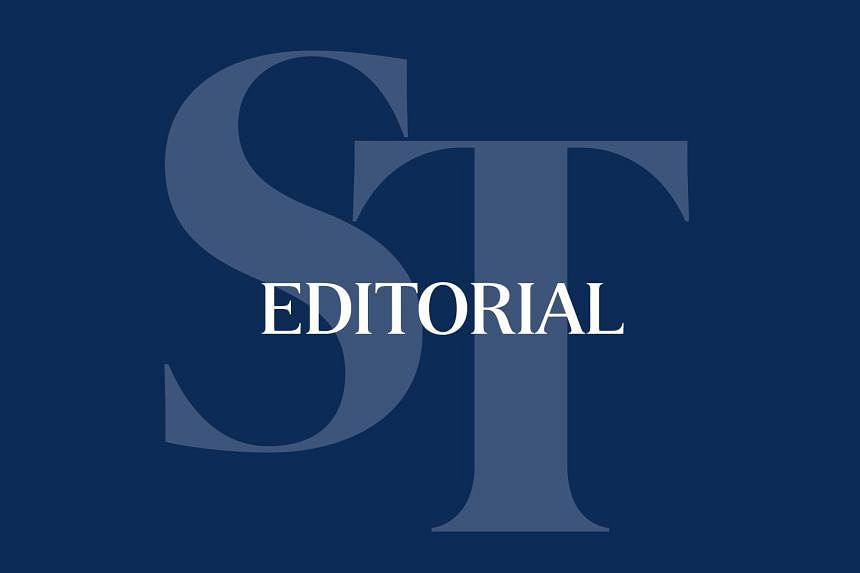
SEP 29, 2023
The biggest-ever money laundering scandal to hit Singapore seems to grow ever larger as investigations proceed. What started as a $1 billion haul of assets when the scandal involving 10 individuals of mainland Chinese origin broke out in mid-August swelled to $1.8 billion by mid-September. The latest estimate is $2.4 billion, which includes bank deposits, gold bars, jewellery, electronic devices, luxury watches and bags, crypto assets, vehicles and more than 110 properties. The suspects, originally from China’s Fujian province, who have passports from countries as far afield as Cambodia, Cyprus, Dominica, Turkey and Vanuatu, are reportedly connected to organised crime syndicates operating overseas and involved in online gambling, scam operations and illegal moneylending. Some are wanted in mainland China.
The scandal was uncovered thanks to information about suspicious transactions filed by financial institutions here, including at least 10 local and international banks. Although this indicates that existing anti-money laundering (AML) provisions are working to an extent, the fact that such vast sums could enter the formal financial system and be converted into assets – be “laundered”, in other words – suggests that more needs to be done. The Monetary Authority of Singapore has said it is looking into whether the financial institutions involved had taken reasonable steps to mitigate money laundering risks. It also plans to tighten surveillance of family offices which manage the finances of the super-rich. Enhanced due diligence would also be needed from other entities, including property companies, dealers in precious metals, jewellery and luxury cars as well as golf clubs.
But despite the best efforts to deal with the scourge of money laundering, the difficulties should not be underestimated. Criminals use a variety of sophisticated means to launder their ill-gotten wealth, including “layering” – the creation of layers of financial transactions routed through shell companies to de-link themselves from the true source of their funds – the use of cryptocurrencies and underground financial institutions; and the changing of identities through new passports or fake identity cards. Although Singapore has strong AML provisions relative to other financial hubs, its open capital account, large financial sector that processes high volumes of transactions, its strong and stable currency and robust property market make it an attractive parking place for dirty money that originates from overseas.
Given that there is no global supervisory mechanism to deal with money laundering, cross-border cooperation, including the sharing of financial data, as well as the use of data analytics, are essential to combat this scourge. As difficult as it is to eliminate money laundering, it is essential for Singapore to send a strong signal, through prosecution, tougher AML provisions and wider enforcement, that it has no place here.
Brother of $2.4b money laundering accused is one of 8 suspects on the run: DPP
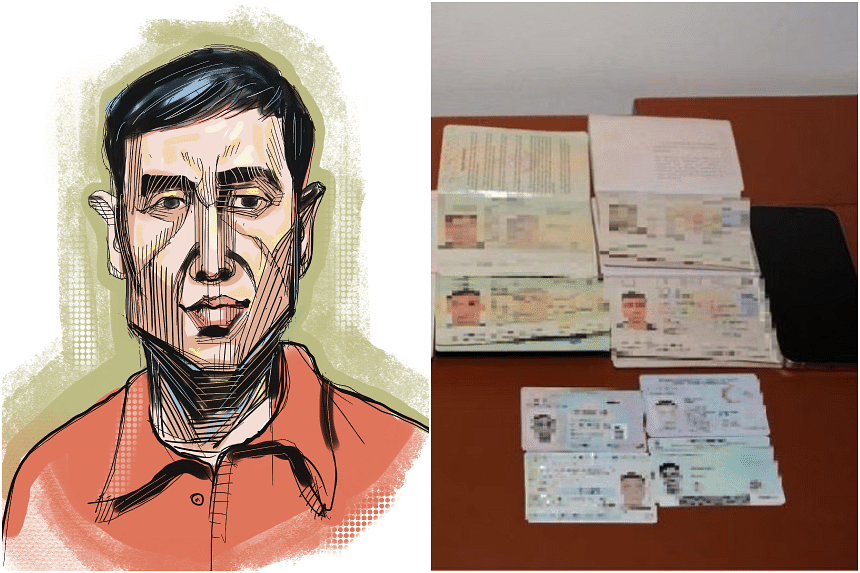
Pointing to Vang Shuiming’s high flight risk, prosecutors said Vang and his wife, son and daughter hold three passports each, from Turkey, China and Vanuatu. ST ILLUSTRATION: CEL GULAPA; PHOTO: SPF
Christine Tan
SEP 29, 2023
SINGAPORE – One of the eight people wanted by the police in Singapore’s worst money laundering scandal is the brother of an accused person involved in the case.
The accused person, Vang Shuiming, is also known as Wang Shuiming. He is one of 10 foreigners, all originally from China, who are accused of being involved in the case that has seen $2.4 billion worth of assets and cash seized.
At Vang’s bail review hearing on Friday, Deputy Public Prosecutor David Koh argued against granting him bail.
He said Vang’s brother, Wang Shuiting, is one of eight people on the run from the authorities here.
Turkish national Vang, 42, was arrested with the other nine accused people in islandwide raids on good class bungalows and high-end condominiums on Aug 15. The raids involved more than 400 officers led by the Commercial Affairs Department.
The police said then that another 12 people were assisting in investigations, while eight others were on the run and had been placed on a wanted list.
After a 2½-hour court session, District Judge Brenda Tan denied Vang bail.
She noted that Vang and his family relocated to Singapore only in 2019. And with the serious charges he now faces, the judge said he had motivation to set up home in another country.
Moreover, the judge said, Vang had admitted to having more than $35.5 million worth of assets overseas, which shows he clearly has the means to relocate comfortably.
DPP Koh said on Friday that Vang is known to be connected to at least three suspects on the wanted list.
Other than Wang Shuiting, the other fugitives have not been named because of operational reasons, said DPP Koh.
He said the three suspects are out of jurisdiction and could help Vang abscond if he was granted bail.
The judge agreed and said there was also the risk of contamination of evidence or collusion with other suspects.
Wang Shuiting is wanted by the Chinese authorities for his involvement in the Heng Bo Bao Wang gambling syndicate uncovered in 2022.
Vang, originally from Fujian province in China, is allegedly an associate of the syndicate. The brothers are among nine members of the gang on the run from the Chinese authorities.
Wang Shuiting is a member of Sentosa Golf Club, which foreigners have to pay about $950,000 to join.
Pointing to Vang’s high flight risk, DPP Koh said Vang and his wife, son and daughter hold three passports each, from Turkey, China and Vanuatu.
Vang admitted he also had a Cambodian passport.
DPP Koh said Vang has sizeable assets overseas, specifically in Cambodia, and this passport would allow him to easily enter the country.
The prosecutor said: “The accused has remained vague and coy about this (Cambodian) passport. He only said it is presently not in his possession, and if he does have this passport, he will surrender it to the police.
“But he refuses to say where this passport is, or even where he believes it to be... It is not a meaningful claim or promise on his part.”
DPP Koh said Vang claimed he had obtained the passports through financial contributions or donations. The prosecutor noted that Vang could easily acquire new passports for himself and his family.
DPP Koh added that Vang also admitted that he made plans to obtain another passport from St Kitts and Nevis, but it is not known if he has obtained it.
Though Vang said it would be difficult, impractical and undesirable for him to uproot his entire family, including his elderly parents and children, the prosecutor cast doubt on this claim.
DPP Koh said Vang had managed to relocate his entire family to Singapore despite being wanted by the Chinese authorities.
The court also heard that investigations have found some evidence that Vang committed the offences he has been accused of.
For instance, he purportedly submitted a forged bank document from China Merchants Bank to Citibank. Investigations so far show he does not have any account with China Merchants Bank.
Yet, Vang has been silent on his position about these allegations, said DPP Koh.
Arguing against the prosecution’s application, defence lawyer Wendell Wong said Vang is willing to surrender all his family members’ passports.
Mr Wong added that Vang had not obtained the passports illegally, but in accordance with the jurisdictions that issued them.
The lawyer also questioned when the Chinese authorities had issued a warrant of arrest for Vang. He said that on Feb 16, Vang entered the Chinese Embassy in Singapore to renounce his citizenship and was not arrested.
Mr Wong added that Vang was willing to be electronically tagged, and put on the Immigration and Checkpoints Authority’s blacklist.
Addressing the concern of collusion, Mr Wong said the court could impose a condition for Vang not to contact any of the known associates.
As for Vang’s position on the allegations, Mr Wong said his client intended to claim trial to the charges.
The lawyer said it would be putting the cart before the horse if the defence was asked to enter its case in bail review proceedings.
DPP Koh replied that people who wish to flee jurisdiction do not always do so via immigration checkpoints. Some may leave illegally.
Though the prosecutor agreed with the defence that there should be presumption of innocence for all accused individuals, he said this does not mean they cannot be held in remand.
Vang faces the most number of charges among the 10 accused. He faces five charges – one count of using a forged document and four counts of money laundering.
In subsequent court mentions after the 10 accused were charged on Aug 16, prosecutors had ordered them to be remanded further amid concerns they might collude with one another or with associates who might interfere with investigations.
Vang had repeatedly asked for bail in these mentions, and also filed an application to the High Court asking for the orders to be revoked. On Sept 5, Justice Vincent Hoong dismissed his bid.
Last Wednesday, the Singapore Police Force said it had conducted more operations, and that additional assets were seized and issued with prohibition of disposal orders.
These included bank accounts with a total estimated value of more than $1.127 billion.
Cash – including foreign currencies – amounting to more than $76 million was also seized.
Other confiscated items included 68 gold bars, 294 luxury bags, 164 luxury watches, 546 pieces of jewellery, cryptocurrencies worth more than $38 million, and 204 electronic devices such as computers and mobile phones.
Prohibition of disposal orders were also issued against more than 110 properties and 62 vehicles worth more than $1.242 billion, bottles of liquor and wine, and multiple ornaments.
The orders mean the accused cannot sell these items.
Vang’s case has been scheduled for a pre-trial conference on Oct 27.
Over $3.8 million in cryptocurrency withdrawn from alleged money launderer’s account while in remand
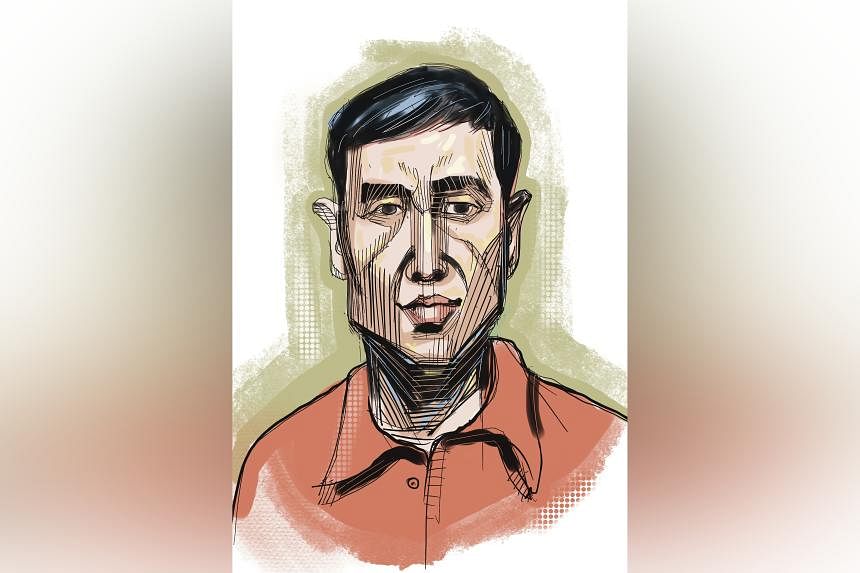
The Commercial Affairs Department did not know about these assets belonging to Turk national Vang Shuiming until they were told by the foreign authorities. ST ILLUSTRATION: CEL GULAPA

Nadine Chua
SEP 29, 2023
SINGAPORE - Cryptocurrency worth more than $3.8 million was withdrawn from the Binance account of one of the accused in Singapore’s worst money laundering scandal two days after his arrest and while he was in remand.
The Commercial Affairs Department (CAD) did not know about these assets belonging to Turkish national Vang Shuiming, 42, until it was told by the foreign authorities.
The CAD’s lead investigation officer (IO) for the case said this showed Vang had connections outside, which made him a high flight risk.
Vang is one of 10 foreigners arrested on Aug 15 and charged the next day with being involved in the money laundering case that has seen assets and cash worth over $2.4 billion seized and issued with prohibition orders.
All 10 are originally from China.
Vang, also known as Wang Shuiming, faces one count of using a forged document and four counts of money laundering.
He was denied bail on Friday.
Mr Teh Yee Liang, the lead IO on Vang’s case, said in his affidavit arguing against bail that Vang’s assets were moved by a person of interest.
The IO said these assets were not known to the CAD initially, and it was alerted to the movement of assets by the foreign authorities.
In total, Vang’s cryptocurrency assets are believed to amount to over $40 million, said Mr Teh.
He said the withdrawal of these assets showed Vang has the means to relocate outside Singapore despite the seizure of his local assets, should he be released on bail.
Mr Teh said Vang has more than $128 million in his personal bank accounts and other corporate accounts owned by him.
Vang’s wife also owns 15 properties worth over $104 million and three vehicles worth more than $3.3 million, bought by Vang.
Taking into account $962,000 worth of cash found in Vang’s home, the couple has more than $243 million worth of assets seized or subjected to prohibition of disposal orders. The orders mean they cannot sell these items.
Mr Teh said Vang also has substantial wealth and assets overseas, which make him a high flight risk.
These include three plots of land in Cambodia worth around $24 million, investments in private companies in China, investments in Turkey, and two condominium units and a factory unit in Xiamen, China.
Mr Teh said this suggests Vang would have the means to flee and live comfortably abroad.
Vang, on the other hand, argued that his parents, aged 66 and 70, are not physically mobile, thus making it extremely difficult for them to migrate to another country.
But Mr Teh said in a reply affidavit that when Vang’s parents visited him at the Police Cantonment Complex on Sept 5, they descended three flights of stairs to the bail centre, then climbed the same flight of stairs.
Mr Teh said: “I was informed that they were able to do so without any difficulty observed. They cannot therefore be said to be ‘not physically mobile’.”
Travel records also showed Vang’s parents had travelled out of Singapore and returned from Hong Kong via a private jet in March, the IO added.
Mr Teh said there was a risk of collusion among suspects involved in the case and contamination of evidence.
He said there was evidence of close associations between Vang, Su Haijin and Su Baolin, who are two other accused people in the money laundering case.
Su Haijin, a Cypriot national, faces one charge of resisting arrest, and another under the Corruption, Drug Trafficking and other Serious Crimes (Confiscation of Benefits) Act.
Su Baolin, a Cambodian national, faces two forgery charges.
In Vang’s affidavit for bail to be granted, he said the charges brought against him relate to what are essentially victimless crimes, where no direct loss was caused to any individual or entity.
Mr Teh refuted this, saying: “In my view, this is simply an attempt to downplay the seriousness of the charges the accused faces.”
The 10 accused were arrested in islandwide raids on good class bungalows and high-end condos on Aug 15, which involved more than 400 officers led by the CAD.
The areas raided included Tanglin, Bukit Timah, Orchard Road, Sentosa and River Valley.
Police said then that another 12 people were assisting in investigations, while eight others were on the run and placed on a wanted list.
On Friday, it was revealed in court that one of the eight is Vang’s brother, Wang Shuiting.
Battling the scourge of money laundering
The ingenious ways of criminals are hard to detect, but steps can be taken to foil their activities

Vikram Khanna
Associate Editor & Senior Columnist
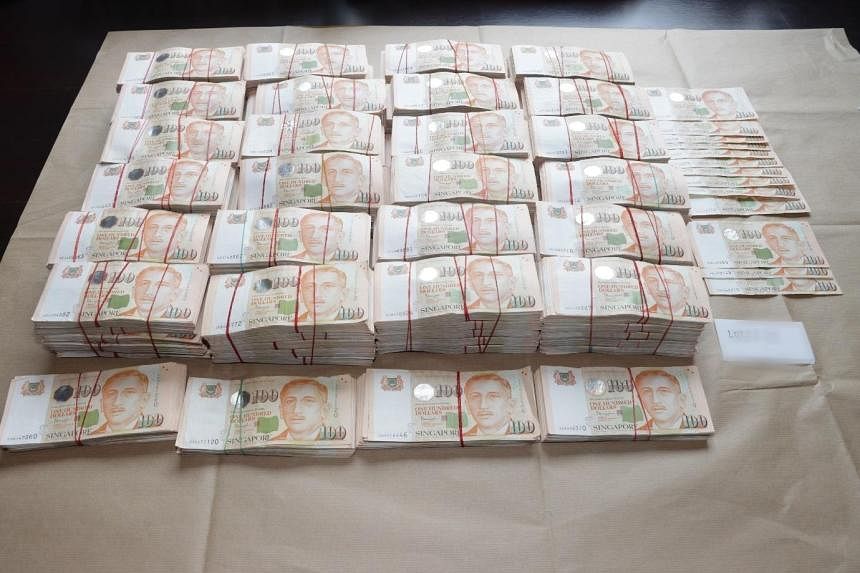
Singapore’s biggest-ever money laundering scandal was uncovered in August and got ever larger as the investigations proceeded. PHOTO: SINGAPORE POLICE FORCE
OCT 3, 2023
In 2015, a man of mainland Chinese origin walked into the River Rock casino in Richmond, a suburb of Vancouver, lugging a hockey bag stuffed with cash amounting to C$1 million (S$1 million). The money – mainly in bundles of C$20 notes – was acquired through drug dealing. He exchanged the lot for high-value betting chips and proceeded to the baccarat tables. After playing for a bit, he cashed his remaining chips for a casino cheque.
He then used that laundered money for a down payment on a high-end condominium in Vancouver, which enabled him to start a relationship with a bank. He was later able to use the property as collateral for borrowing.
This incident of money laundering is recounted in the 2021 book, Wilful Blindness: How A Network of Narcos, Tycoons And CCP Agents Infiltrated The West, by Canadian investigative journalist Sam Cooper. Official investigations revealed that in July 2015, the casino accepted C$13.5 million in C$20 bills alone.
Such crude forms of money laundering – in this case, from drug cash to casino cheque to condo purchase – are still prevalent in the world, but criminals also use more sophisticated means to launder their money.
In August, Singapore’s biggest-ever money laundering scandal was uncovered and got ever larger as the investigations proceeded. The amount involved started in mid-August at $1 billion. By mid-September, it swelled to $1.8 billion, and the latest estimate is $2.4 billion. The assets seized included bank deposits, cash, gold bars, cryptocurrencies, jewellery, liquor, electronic devices, luxury bags and watches, at least 62 vehicles and more than 110 properties.
The 10 suspects, all of mainland Chinese origin with passports from countries including Cambodia, Cyprus, Turkey and Vanuatu, were reportedly connected to organised crime syndicates involved in online gambling, scam operations and illegal moneylending overseas, which suggests they did not generate their money in Singapore. Some of them are wanted in China, which prohibits online gambling, through which the criminals made a lot of their money targeting gamblers on the mainland.
Ingenious methods
How they managed to get their money into Singapore’s banking system and into property and other asset markets has not yet been revealed. But money launderers are known to use several ingenious ways to make dirty money legitimate.One of the most common is “layering”, whereby they create “layers” of multiple financial transactions routed through shell companies, using nominees in tax havens to delink themselves from the true source of their funds.
Another widely used method is to use foreign investors to get dirty money into the formal financial system, which helps to obscure its origins. For example, a criminal organisation can give cash to a foreign investor who, after taking a commission, invests in a business owned by that organisation. If it is a cash-based business, all the better because reported cash revenues can be inflated, which enables more money to be laundered.
According to financial lore, the term money laundering originates from the cash-based business of a chain of laundromats owned by notorious gangster Al Capone in the United States in the 1920s – although the practice of hiding true sources of wealth has been going on for centuries.
Criminals also use underground financial institutions to send money overseas. Mr Cooper mentions in his book that these institutions were instrumental in enabling Chinese criminals to evade the US$50,000 (S$68,500) limit per individual that China sets for overseas transfers.
Cryptocurrencies, some of which enable speedy global transfers with high levels of privacy, are another means used by criminals to transfer funds overseas. To avoid detection, money launderers also use multiple passports and fake identities.
The appeal of real estate
When it comes to the placement of laundered funds – or their “integration” into the economy, in financial jargon – real estate is particularly appealing. It enables large amounts to be placed, tends to hold its value, or appreciate and can yield returns. Singapore’s property market, which has remained resilient in recent years, is a prized target for money launderers.There is evidence that Singapore’s property market may have been vulnerable to inflows of illicit wealth. This is shown in a 2021 paper by Professor Sumit Agarwal from the Department of Economics, Finance and Real Estate and Ms Chia Liu Ee and Professor Sing Tien Foo of the Institute of Real Estate and Urban Studies at the National University of Singapore.
In the paper, the authors use data from the Panama Papers – a leak of 11.5 million financial documents in 2016 from a Panama-based law firm that revealed the use of offshore tax regimes by the world’s super rich, including for their undisclosed wealth.
The authors matched the names of individuals implicated in the Panama Papers with data on private property transactions in Singapore from 1995 to 2018 which contained the names and nationalities of property buyers. They found that Panama Papers-linked individuals were involved in 2,331 property transactions in Singapore over the period.
The individuals mostly bought high-end properties and paid a premium (above the asking price) averaging 3.8 per cent. Interestingly, the premium declined after the tightening of regulations to combat money laundering and terrorist financing in 1992, 2002 and 2007, and after legislation to strengthen oversight of real estate brokers in 2010.
The authors also found the involvement of locals in some property deals involving individuals implicated in the Panama Papers. Notably, they found that the proportion of Housing Board upgraders among Panama-linked buyers of properties was “exceptionally high”. Real estate agents also constituted a large share of buyers in Panama-linked property transactions. According to the authors, this suggests that some local buyers may be “straw buyers” – or proxy buyers – who buy properties on behalf of third parties.
The authors estimate the illicit wealth that poured into Singapore’s housing market averaged $3.72 billion a year from 1995 to 2018.
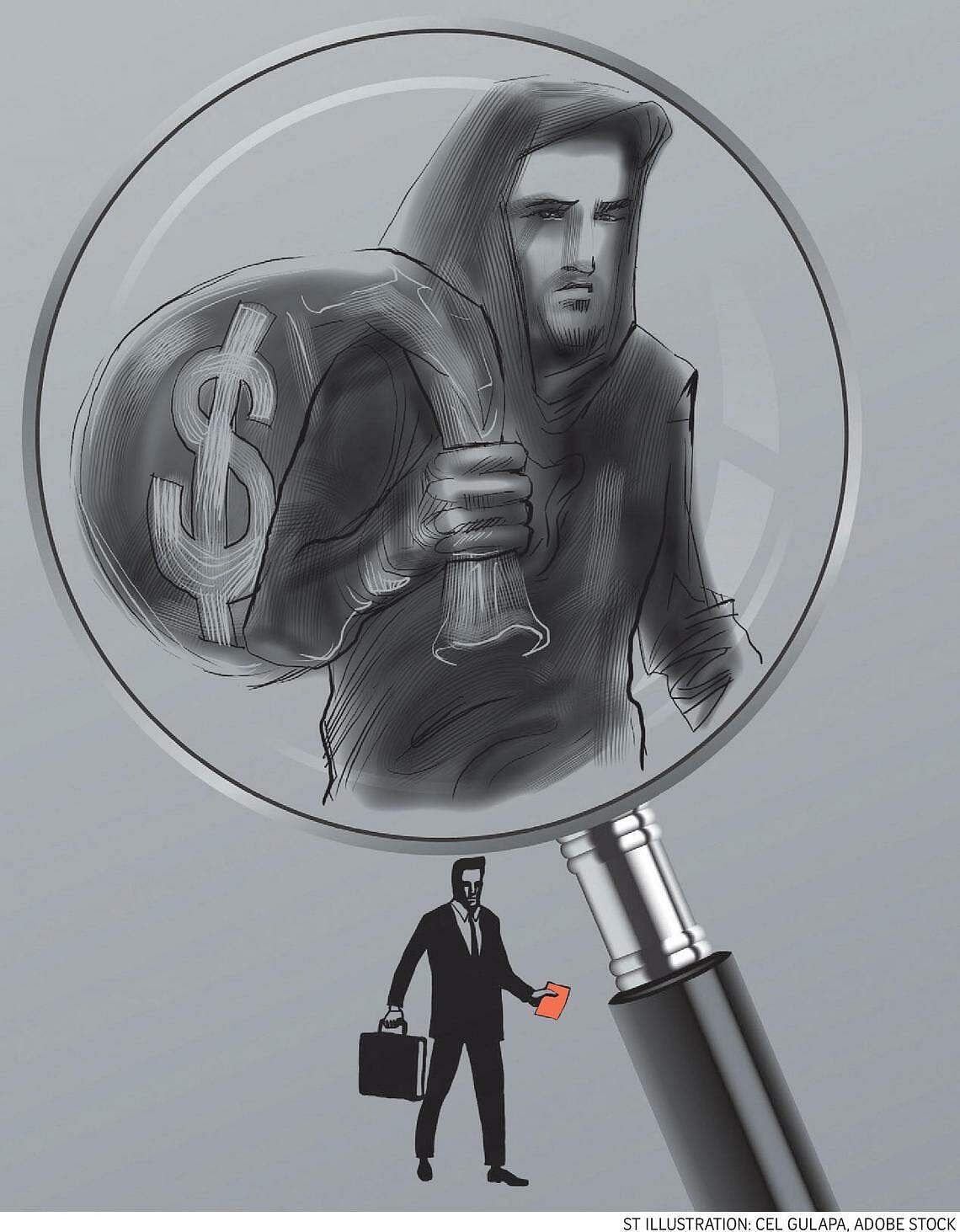
ST ILLUSTRATION: CEL GULAPA
Singapore, a favoured destination
Besides its resilient property sector, there are many other reasons why Singapore, like Canada, Australia, Britain and other advanced economies, is a favoured destination for money launderers.It is politically stable, has an open capital account that enables the easy flow of funds in and out, and a strong currency. It also has a large financial sector that offers a variety of financial instruments and processes a high volume of transactions, which makes illicit transactions harder to identify.
Singapore ranks high in various independent anti-money laundering indexes. For example, in the Basel AML (anti-money laundering) Index 2022, which assesses the risk of money laundering and terrorist financing, it ranks 100 out of 128 regions – where 128 is the lowest risk – ahead of the US and Switzerland as well as financial hubs, Hong Kong and Dubai.
The latest incident of money laundering was uncovered thanks to information about suspicious transactions filed by financial institutions, including at least 10 local and international banks. Although this indicates that existing anti-money laundering provisions are working to an extent, the fact that billions of dollars in dirty money originating from overseas can still enter the formal financial system and be converted into assets – get “laundered”, in other words – suggests that Singapore’s regulatory authorities have more to do.
The Monetary Authority of Singapore (MAS) said it is looking into whether financial institutions involved had taken reasonable steps to mitigate money laundering risks. Some banks are reportedly reviewing new account openings as well as transactions involving clients of mainland Chinese origin with passports obtained through investments.
MAS also plans to tighten surveillance of family offices, which manage the finances of the super rich and have almost tripled in number since 2020 to 1,100 as at the end of 2022. Enhanced due diligence would also be needed from other entities, including property companies, real estate agents, auditors, lawyers, dealers in precious metals, jewellery and luxury cars as well as golf clubs, casinos and even charities – all of which are potential enablers or targets for money launderers.
Financial cooperation is essential
Although there is a Paris-based organisation called the Financial Action Task Force that sets standards for countries to counter money laundering, there is no global body to enforce action against money launderers who operate globally, which means cooperation among financial authorities is essential.Particularly important in the context of the latest money laundering case is cooperation among the authorities in other South-east Asian countries, including Cambodia, Myanmar and the Philippines, where the illegal funds were generated, as well as China, where a large proportion of the funds originated.
Among the areas of collaboration, the International Monetary Fund recommends cross-border data collection and the exchange of information on money laundering incidents. The use of data analytics and artificial intelligence can help in these processes.
In that it merely legitimises dirty funds, money laundering may seem a victimless crime, but it is not. It enables criminals to benefit from activities such as drug dealing, underground gambling, human trafficking, weapons trading and financial scams that are the sources of their wealth and helps them perpetuate and expand such activities, at enormous cost to society. It also enables tax evasion and corrupts financial systems and economies.
Given its scale and the sophisticated methods used by criminals, money laundering can be difficult to detect and will probably never be defeated. Money launderers will always try to be one step ahead of regulators in what is a financial cat and mouse game.
But with more vigilance, not only on the part of the authorities but also among all the entities exposed to the scourge, as well as enforcement, aided by international cooperation and technology, the job of money launderers can be made more difficult.
S’pore money laundering case among world’s largest with assets seized worth over $2.8b
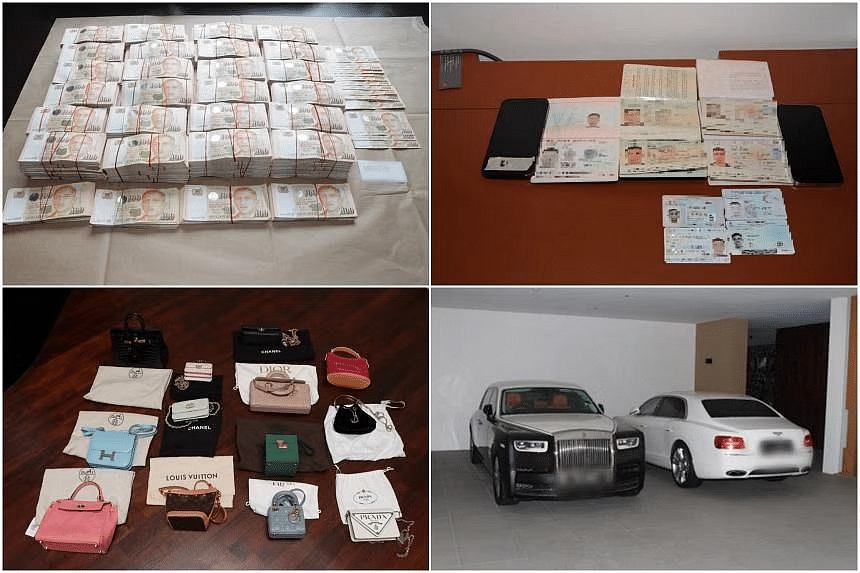
Following islandwide raids on Aug 15, assets seized or issued with prohibition of disposal orders are now worth more than $2.8 billion. PHOTOS: SINGAPORE POLICE FORCE

Nadine Chua
OCT 3, 2023
SINGAPORE – The first sign of trouble, that something big was afoot, came in 2021 when the authorities noticed possibly forged documents being used to substantiate sources of funds in bank accounts here.
So as not to alert the suspected money launderers, only a small group of police officers was involved in initial investigations.
After an extensive probe in 2022, the police uncovered a web of people allegedly transferring money to Singapore from abroad that was suspected to be earned from criminal activities. Some of the people were connected by family ties.
The assets seized or issued with prohibition of disposal orders following islandwide raids conducted on Aug 15 are now worth more than $2.8 billion, making it one of the world’s largest money laundering cases.
Second Minister for Home Affairs Josephine Teo said this in a ministerial statement on Tuesday to address about 60 parliamentary questions filed on the case.
She said the authorities were alerted in 2021 when they picked up several signals, including the use of suspected forged documents to support sources of funds in bank accounts here.
Some suspicious transaction reports (STRs) were filed by financial institutions and other companies, and the police investigated these alerts.
In early 2022, the police launched an extensive intelligence probe that uncovered a web of people believed to be connected to one another, including by familial ties.
Mrs Teo said: “The police analysed the information and probed further, quietly. To avoid alerting the suspects, the work was kept to a very small group of officers, and a decision was made to hold off any enforcement or overt investigative actions.”
She said the aim of the police was to develop as full a picture as possible of the suspects and their associates, their suspected criminal activities and their assets, before moving against them.
Mrs Teo added: “As the probe progressed, the web uncovered by the police grew and grew.
“More and more individuals were implicated in the alleged money laundering operation, and more and more of their assets held in Singapore were discovered. The police painstakingly and discreetly traced their ties and assets.”
She highlighted that anti-money laundering probes of this scale and nature are complex.
She said: “Had the suspects caught wind of our probes, the suspects and their assets might have fled, and the investigations and the entire operation might have been jeopardised.”
Mrs Teo said that earlier in 2023, the police consulted the Attorney-General’s Chambers, which decided there was sufficient reason to suspect that the criminal offences had been committed in Singapore.
Following extensive reviews of information and evidence, the police conducted a massive islandwide blitz on Aug 15 that involved more than 400 officers led by the Commercial Affairs Department.
Nine men and one woman were arrested and charged the next day with offences including money laundering, forgery and resisting arrest.
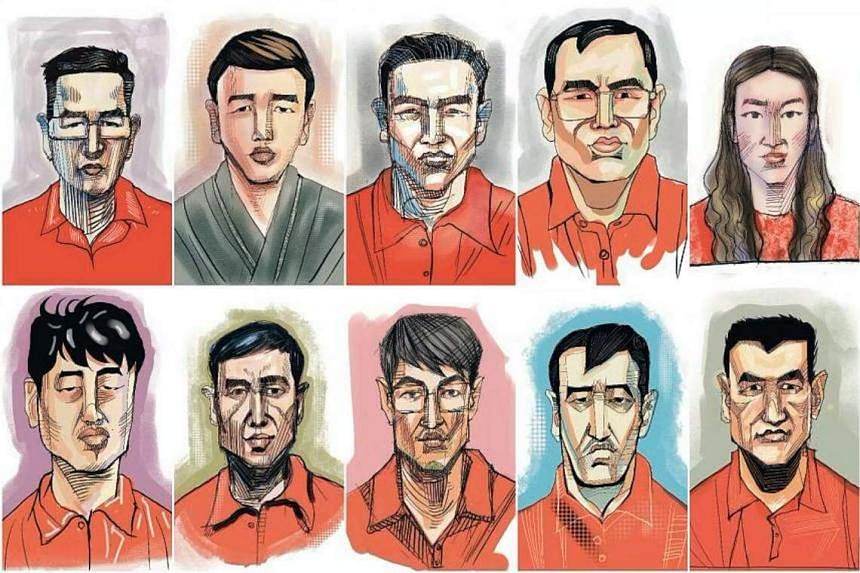
The 10 suspects are (clockwise from top left) Su Baolin, Su Haijin, Chen Qingyuan, Su Wenqiang, Lin Baoying, Zhang Ruijin, Wang Dehai, Su Jianfeng, Vang Shuiming and Wang Baosen. ST ILLUSTRATIONS: CEL GULAPA
It is Singapore’s worst money laundering case so far.
Addressing reports from international and domestic news outlets that the operation had been done at the behest of China, Mrs Teo said: “This is completely untrue. Singapore does not need another country to tell us what to do to enforce our laws, nor will we do anything unless it is in our own interests.
“In this case, we started investigations because we suspected that offences had been committed in Singapore. Once we confirmed our suspicions, we acted.”
In an update on the case, which is now before the courts, Mrs Teo said the proceeds most likely came from criminal activities abroad, including illegal online gambling and unlicensed moneylending.
There are others who have not been arrested but are assisting with investigations, she said. Other individuals are wanted by the police for investigations, but are not in Singapore.
She said the police had conducted further operations, and the authorities have taken control of over $2.8 billion worth of assets.
These assets include 152 properties and 62 vehicles with an estimated value of more than $1.24 billion, money in bank accounts amounting to more than $1.45 billion, and cash of various currencies worth more than $76 million.
Other items include thousands of bottles of liquor and wine, cryptocurrency worth more than $38 million, 68 gold bars, 294 luxury bags, 164 branded watches and 546 pieces of jewellery.
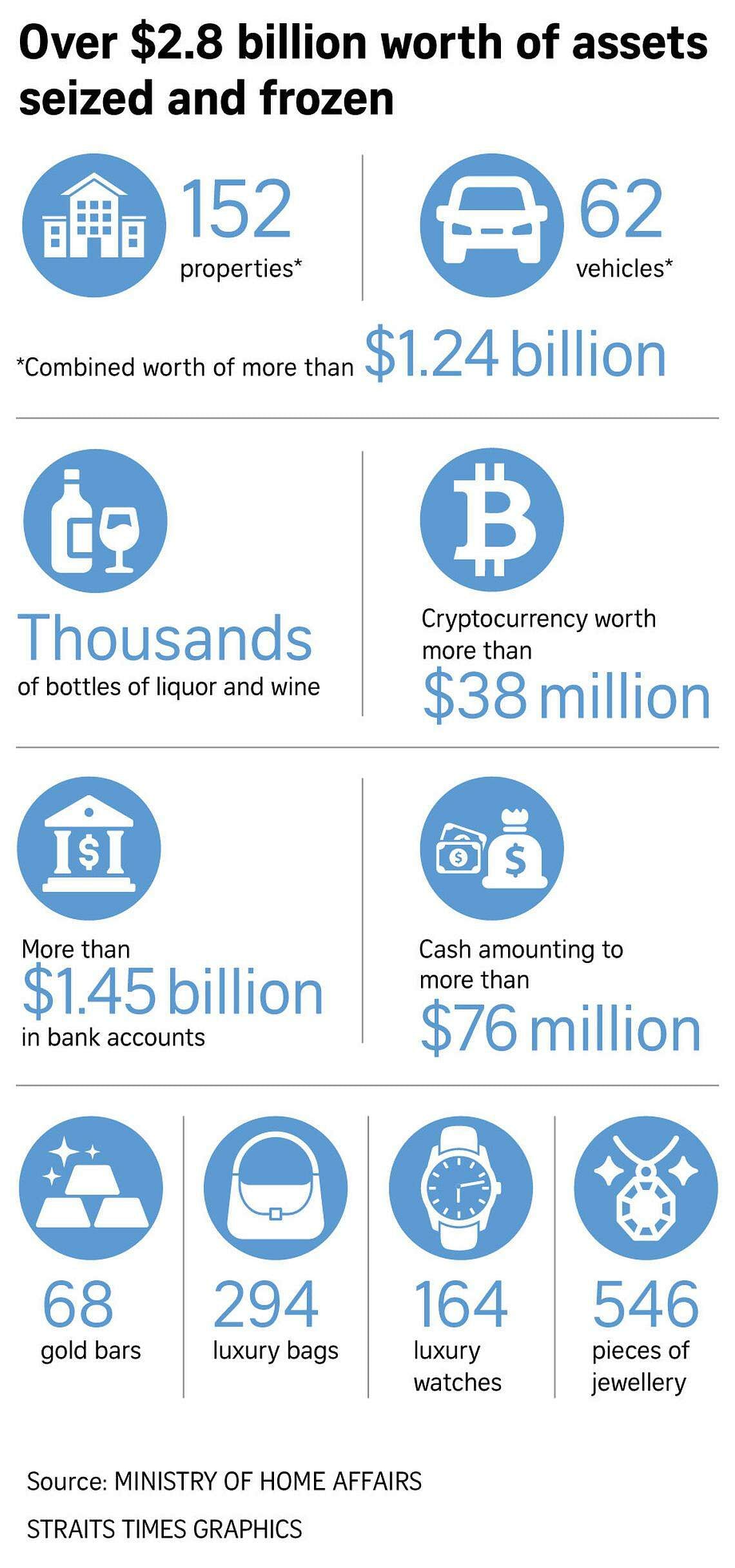
Mrs Teo said there may be more arrests made and assets seized.
The police had said on Sept 20 that the total value of assets seized and frozen in the case stood at more than $2.4 billion.
Mrs Teo added that a number of the people arrested had donated to charities here.
“Some charities have decided on their own to ringfence these donations. Others have made police reports and plan to surrender the monies to the police,” she said.
The Commissioner of Charities will issue an advisory to encourage all charities to review their donor records.
This is to check whether they have received donations from the accused and entities linked to them, and file STRs if needed, the minister added.
The advisory will also include advice to charities on how to handle the monies.
Calling this case one of the largest anti-money laundering operations in the world, Mrs Teo said: “We will not hesitate to take strong enforcement action against people who would use Singapore as a haven to launder proceeds of crime. We will deal with them and their ill-gotten gains to the fullest extent of our laws.”
One or more in money laundering case may be linked to family offices given tax incentives
Property transactions in $2.8b money laundering case likely had minimal impact on prices: Indranee
Mrs Teo noted that from 2020 to 2022, at least 240 people were convicted of money laundering offences, largely for laundering proceeds from domestic scams.
During this period, the police seized more than $1.2 billion worth of assets. This amount is less than half of that involved in the current case.
The minister said many people, including Singaporeans, permanent residents and those on different types of immigration passes, had been interviewed in relation to the case. More will be probed as investigations continue.
She added: “Anyone who is found complicit in... wrongdoing after ongoing investigations will be dealt with in accordance with the law, regardless of their immigration status or whether they are Singapore citizens.”
The minister highlighted the three prongs in Singapore’s anti-money laundering strategy: prevention, detection and enforcement.
Stressing the importance of prevention, Mrs Teo said: “We have a robust legal and regulatory framework. Gatekeepers in various sectors have to comply with anti-money laundering requirements, including the conduct of due diligence.”
The second prong of the Government’s anti-money laundering regime is detection, said the minister.
“Our laws make it a duty for everyone – including but not limited to landlords, property developers, financial institutions and corporate service providers – to report suspicious transactions,” she said.
Finally, enforcement is imperative in Singapore’s anti-money laundering strategy, which is about taking strong action when there is suspicion of money laundering, added Mrs Teo.
To ensure that the country’s strategy to tackle money laundering remains robust, an inter-ministerial committee, led by Second Minister for Finance Indranee Rajah, will be set up to oversee the Government’s anti-money laundering efforts.
Noting that the police’s investigations in this case had strengthened Singapore’s reputation as a serious, high-quality financial hub, Mrs Teo said: “It will strengthen trust and confidence among investors, and Singaporeans, that we run a clean system that stands amongst the tallest in the world.”
When rounding off her statement, she said: “Singapore has in place a robust anti-money laundering regime. We are held in high regard internationally not just as a financial centre, but for our strong, principled and no-nonsense approach to taking down individuals who break our laws.”
She added that the country is taking steps to update its measures to keep pace with evolving risks and trends, and strengthening its capabilities to proactively detect and take firm enforcement action against wrongdoing.
“Nevertheless, this case is a reminder that even the most stringent preventive measures can be circumvented by determined criminals. But it also shows that our system is able to detect suspicious individuals and activities, and that when we do, we have the resolve and capabilities to track them down, and take them to task,” she said.
Property transactions in $2.8b money laundering case likely had minimal impact on prices: Indranee
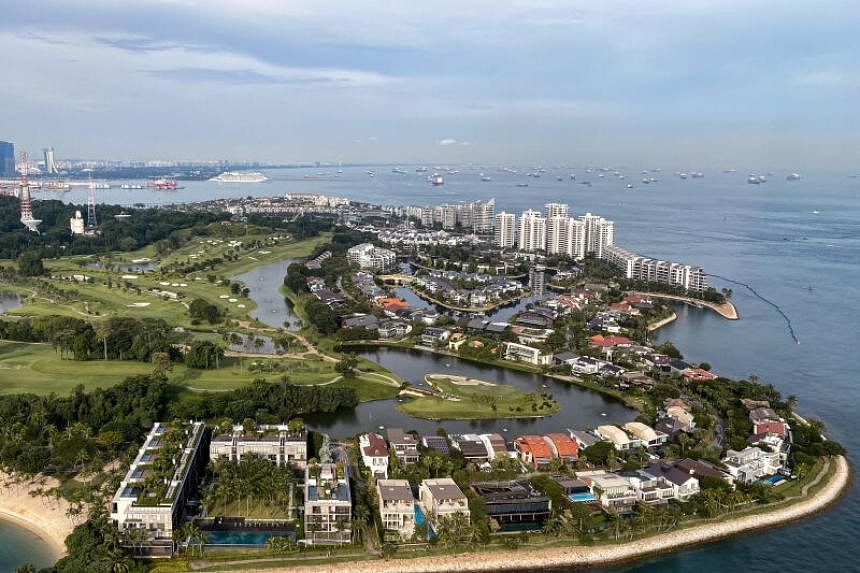
Ninety-four residential properties have been issued with prohibition orders to date, including eight landed homes in Sentosa Cove. PHOTO: ST FILE

Isabelle Liew
OCT 3, 2023
SINGAPORE - The property transactions involved in Singapore’s biggest money laundering case are likely to have had minimal impact on prices, said Second Minister for National Development Indranee Rajah.
She told Parliament on Tuesday that while it is hard to pinpoint the exact effect on the property market, the transactions made up an insignificant share of residential, commercial and industrial sales.
The authorities have issued prohibition of disposal orders against 152 properties and 62 vehicles, totalling an estimated value of more than $1.24 billion. The orders mean they cannot be sold. In all, the total value of assets linked to the case has risen to more than $2.8 billion.
Giving an update on the case in a ministerial statement, Ms Indranee said 94 residential properties have been issued with prohibition orders to date, including eight landed homes in Sentosa Cove. Of these, 60 were completed resale units and 34 were uncompleted units sold by developers.
Fifty-three commercial properties and five industrial properties have also been issued with prohibition orders.
Investigations are ongoing into the property agencies and agents who facilitated the transactions involved in the money laundering probe, Ms Indranee added.
“We will fully investigate the incident and, if any breaches are found, take the necessary regulatory action.”
On Workers’ Party MP He Ting Ru’s (Sengkang GRC) question on the Government’s considerations in allowing foreigners to buy landed homes in Singapore, Ms Indranee said the number of approvals granted under the Residential Property Act remains low.
In 2022, 34 approvals were granted to permanent residents (PRs) to own landed residential property on the mainland. In 2021, 51 approvals were granted, and 24 in 2020.
In contrast, an average of 2,700 landed property transactions were recorded annually on the mainland over the same period, she added. There are more than 73,000 landed homes in Singapore.
Ms He had also asked about the “exceptional economic contribution” criteria that foreign nationals have to fulfil.
The Government takes a very strict approach when granting such approvals, said Ms Indranee, who is also Second Minister for Finance. Applicants must have been a Singapore PR for at least five years and made exceptional economic contributions to Singapore, such as through income tax contributions.
Another consideration is whether applicants have a “strong Singapore nexus”, she added. For example, this would include PRs with children who have served national service and those who have demonstrated strong commitment to Singapore.
“These factors point towards an applicant’s connection to Singapore, and their long-term commitment and contribution to Singapore,” she said.
Ms Indranee said the Singapore Land Authority received 88 applications from foreigners to buy landed properties in Sentosa Cove in the past three years. “All but two have been approved,” she said in response to Nominated MP Neil Parekh. Approvals are generally granted to foreigners who are not PRs as the island’s development was aimed at an international clientele, she added.
Ms Indranee reiterated that the eight landed homes issued with prohibition of disposal orders are Sentosa Cove properties, while the rest are non-landed units.
None of them are landed homes on the mainland, she said.
She noted that there are no restrictions on foreign ownership of non-landed residential homes, since landed residential properties on the mainland have been set aside primarily for Singaporeans.
Overall, the proportion of foreign property purchases remains low at about 2 per cent, she said, noting that additional buyer’s stamp duty rates for foreigners were raised from 30 per cent to 60 per cent in April to dampen local and foreign investment and prioritise Singaporean owner-occupation.
Ms Indranee also outlined the measures in place in the property sector to tackle money laundering, noting that they have been progressively strengthened.
For instance, the prescribed duties of property agents were legislated in 2021, and anti-money laundering requirements were extended to developers of residential, commercial and industrial properties in 2023.
Property agents, agencies and developers are the first line of defence against money laundering in the real estate sector and, as gatekeepers, they have a duty to perform customer due diligence checks on clients, she said.
These include verifying the identity of the client or the beneficial owner, screening these parties, assessing their level of risk and maintaining records.
Any person who knows or has reasonable grounds to suspect any property’s connection to criminal conduct is required to file a suspicious transaction report, she said.
This includes property agents, agencies, developers, landlords and professionals such as conveyancing lawyers, accountants and financial institutions.
Conveyancing lawyers and accountants also have to perform customer due diligence checks when carrying out any acquisition, divestment or any other dealing of any interest in real estate, she added.
Developers are not allowed to accept cash payment for sales of uncompleted properties, she said.
Ms Indranee noted that there are several layers of defence in the real estate sector to mitigate risks of money laundering and protect the system from abuse.
The vast majority of transactions are subject to checks of some form and at various stages, she said. Gatekeepers who fall short of their duties will face penalties.
In terms of enforcement, the Council for Estate Agencies (CEA) oversees property agents and agencies, while the Urban Redevelopment Authority regulates developers, Ms Indranee said. The agencies play an important role in ensuring that gatekeepers carry out their responsibilities properly, she added.
Ms He asked how many property agents, developers and owners have been investigated in the last three years for failing to exercise customer due diligence checks.
Ms Indranee said that since 2021, the CEA has taken action against two property agents who were found guilty of breaching the Estate Agents Act and prevention of money laundering and financing of terrorism rules.
They had failed to comply with regulations relating to obtaining, documenting and verifying the accuracy of their clients’ identity information. They also failed to assess the risk of clients engaging in money laundering or terrorism financing, she added.
In the latest case in July 2023 – unrelated to the money laundering scandal – the agent was fined $4,000 and suspended for four months.
New inter-ministerial committee to review, strengthen anti-money laundering controls: Indranee
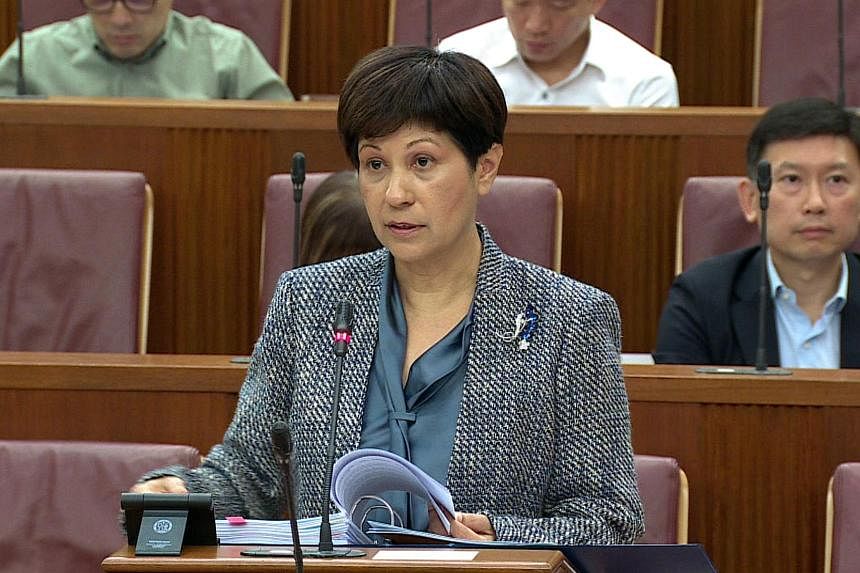
The inter-ministerial committee will be chaired by Ms Indranee Rajah and comprise office holders from MAS as well as the ministries of Home Affairs, Law, Manpower and Trade and Industry. PHOTO: MCI

Timothy Goh
OCT 4, 2023
SINGAPORE – An inter-ministerial committee will be set up to review Singapore’s financial system and strengthen its anti-money laundering regime, Second Minister for Finance Indranee Rajah said.
“Criminals are increasingly sophisticated and will constantly find new ways to circumvent our laws and regulations. Thus, we must continue to strengthen our information-gathering and intel-sharing capabilities to better detect illicit activities conducted by companies incorporated in Singapore,” she said.
Ms Indranee was responding to questions raised in Parliament on Tuesday in relation to one of Singapore’s biggest money laundering cases involving more than $2.8 billion in assets, including properties, luxury cars and cash.
The inter-ministerial committee will be chaired by Ms Indranee and comprise office-holders from the Monetary Authority of Singapore, Ministry of Home Affairs, Ministry of Law, Ministry of Manpower and Ministry of Trade and Industry.
It will focus on four areas.
First, how to prevent corporate structures from being abused by money launderers.
Second, how financial institutions can enhance their controls and collaborate more effectively to guard against and flag suspicious transactions.
Third, how other players in the system, such as corporate service providers, real estate agents, and precious stones and metals dealers, can help to guard against money laundering risks.
Finally, how to centralise and strengthen capabilities across government agencies to better detect suspicious activity.
Ms Indranee also highlighted some of the existing measures put in place by the Accounting and Corporate Regulatory Authority (Acra) to deter the misuse of companies for money laundering.
All companies are required to have at least one director resident in Singapore, to ensure that someone can be held accountable for any breaches committed by the company in Singapore.
Non-resident foreigners looking to set up companies in Singapore will therefore need to either appoint a resident business partner as a director or appoint a nominee director to act on their behalf.
In line with international benchmarks, there are currently no limits to the number of companies that a director can be involved in. However, 99 per cent of directors here hold fewer than 10 directorships, Ms Indranee said.
Still, restrictions on directorships to ensure that nominee directors are fit and proper to take up the role, and whether it would be useful to limit the number of nominee directorships that one can hold, are being studied. These proposals will be tabled in Parliament in early 2024, Ms Indranee said.
Post-incorporation, Acra looks for signs of inactivity, such as failure to file annual returns, and will strike off companies that remain inactive after a period of time or are flagged via intelligence by other agencies.
About 17,000 such companies have been struck off over the last five years, Ms Indranee said.
She added that the companies associated with the money laundering case have been filing returns with Acra and have thus remained on the register.
Acra currently imposes additional requirements on foreign-owned or foreign-controlled companies.
For example, non-residents who are looking to set up companies in Singapore must engage Acra-authorised corporate service providers, also known as Registered Filing Agents (RFAs), to incorporate a company.
RFAs are legally required to conduct customer due diligence, by identifying and verifying the identities of the customer and the beneficial owners of the intended incorporated company.
They must ensure that a customer’s identity is established through additional documents or information if the customer is not present, and inquire about the purpose and legitimacy of the use of a company structure.
RFAs must also not proceed with the incorporation of the company and should file a Suspicious Transaction Report if a customer fails due diligence checks.
Ms Indranee said that between 2021 and 2023, Acra imposed 24 sanctions against RFAs, including eight cases where the RFA’s registration was cancelled or suspended.
She also noted that Acra is investigating the role played by the RFAs involved in the money laundering case, and will take enforcement action as necessary.
Additional measures, including enhancing the penalties on errant service providers to strengthen the effectiveness of Singapore’s anti-money laundering regime, have been planned. These proposals will be tabled in Parliament in early 2024, Ms Indranee said.
“Singapore is determined to preserve our hard-earned reputation as a clean and trusted business hub. We will continue to hold our zero-tolerance approach towards money laundering, and do our best to ensure a strong and robust regulatory regime,” she said.
One or more in $2.8b money laundering case may be linked to family offices given tax incentives in S’pore
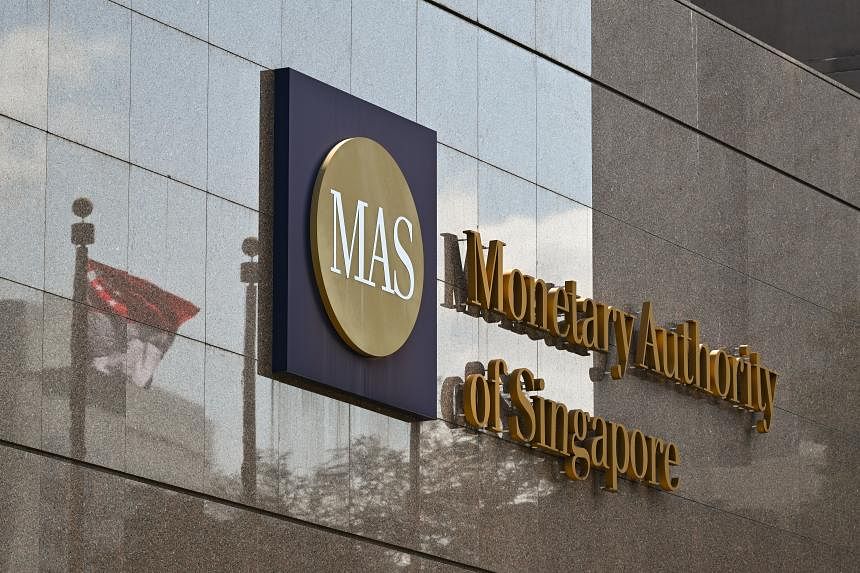
The number of single-family offices awarded tax incentives by the Monetary Authority of Singapore was 1,100 as at the end of 2022, up from 700 in 2021. ST PHOTO: LIM YAOHUI

Angela Tan
Senior Correspondent
OCT 4, 2023
SINGAPORE – One or more of the accused in a recent money laundering case may have been linked to single-family offices (SFOs) that had been awarded tax incentives by the Monetary Authority of Singapore (MAS), said Minister of State for Trade and Industry Alvin Tan.
Speaking in Parliament on behalf of Deputy Prime Minister and Finance Minister Lawrence Wong, Mr Tan said the financial regulator was reviewing its internal incentive administration processes for SFOs, and will tighten them where necessary.
In addition, the regulator is conducting “detailed supervisory reviews and inspections of the financial institutions with a major nexus to the case”. It will also take a critical look at how the suspects were able to access financial services in Singapore.
In August, the Singapore police arrested and charged 10 people and seized close to $1 billion in assets, including luxury properties, gold bars, designer handbags, cash, crypto assets and cars.
To date, the value of assets seized or issued with prohibition of disposal orders has swelled to more than $2.8 billion, making it one of the world’s largest money laundering cases.
Some of the suspects have been accused of presenting forged documents to banks.
Mr Tan said MAS would assess whether the banks had upheld robust anti-money laundering practices as well as practices to counter the financing of terrorism.
“We must and will do more,” said Mr Tan, adding that it was a matter of concern that financial assets worth more than $1.45 billion had been seized in relation to this case.
Mr Tan, who is also an MAS board member, noted that the SFOs were subject to anti-money laundering checks before the tax incentives were granted.
“At the point of application, no adverse information of note related to the individuals and entities had surfaced,” Mr Tan said.
A family office is a private wealth management advisory firm set up by a family to oversee the day-to-day administration and management of assets and investments with the goal of preserving wealth and transferring it to the next generation. An SFO manages assets on behalf of one family.
The number of SFOs awarded tax incentives by the MAS was 1,100 as at the end of 2022, up from 700 in 2021.
Mr Tan told Parliament that all SFOs applying for MAS’ tax incentives are required to show proof that they have opened accounts with financial institutions in Singapore.
Before onboarding them as customers, financial institutions have to conduct robust due diligence checks on them. MAS also screens the individuals and entities involved in the SFO against databases and other information sources for money laundering, terrorism financing and other adverse news, he added.
On July 31, MAS launched a public consultation to strengthen surveillance and defence against money laundering risks in the SFO sector. The consultation closed on Saturday.
MAS is proposing to bring all SFOs under anti-money laundering controls by standardising criteria for licensing exemptions.
The SFOs must also report annually on total assets managed after the end of each calendar year and maintain a business relationship with an MAS-regulated financial institution that will carry out anti-money laundering checks on them.
In the light of findings from this case, MAS will study whether measures beyond those proposed in the consultation are necessary to ensure that its approach to SFOs remains robust, said Mr Tan.
Mr Tan elaborated on MAS’ three-pronged strategy involving prevention, detection and enforcement when dealing with money laundering.
In prevention, MAS imposes stringent anti-money laundering/combating the financing of terrorism requirements on financial institutions. These requirements are in line with the standards set by the Financial Action Task Force and international best practices.
Among the requirements, financial institutions must perform due diligence checks on their customers. This includes verifying their identities and monitoring accounts to detect suspicious customer transactions or activities.
For higher-risk customers, financial institutions must perform additional checks to establish if their wealth and funds are legitimate.
Where a financial institution detects suspicious customer behaviour, it must promptly report this to the Suspicious Transaction Reporting Office and take appropriate mitigation measures, such as placing restrictions on the account or, where warranted, terminating the customer relationship.
MAS also regularly alerts financial institutions to emerging risks and crime typologies, said Mr Tan, who encouraged the financial industry to deploy data analytics to further sharpen its detection capabilities.
On this front, MAS will be introducing a digital platform known as Cosmic that will allow banks to share information on customers whose behaviour or profiles show potential financial crime concerns.
Plans are on track to roll out the platform to six banks in the second half of 2024, if not earlier, Mr Tan said.
“At this stage, there are no plans to extend Cosmic to entities beyond the financial sector, or for Cosmic information to be shared directly with financial institutions overseas or with international counterparts,” he said.
From 2020 to 2022, at least 240 people were convicted of money laundering offences, with the police seizing more than $1.2 billion worth of assets in these investigations.
In the past five years, 17 financial institutions were taken to task for breaching anti-money laundering/combating the financing of terrorism requirements.
Similar threads
- Replies
- 15
- Views
- 877
- Replies
- 1
- Views
- 301
- Replies
- 4
- Views
- 646
- Replies
- 5
- Views
- 773
- Replies
- 10
- Views
- 625

